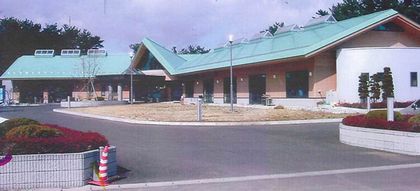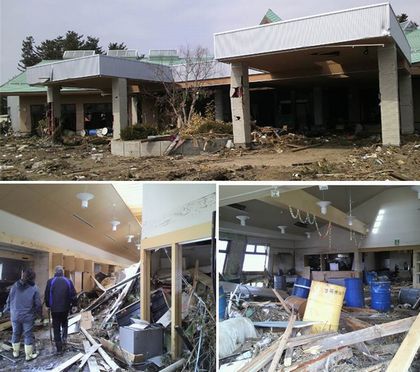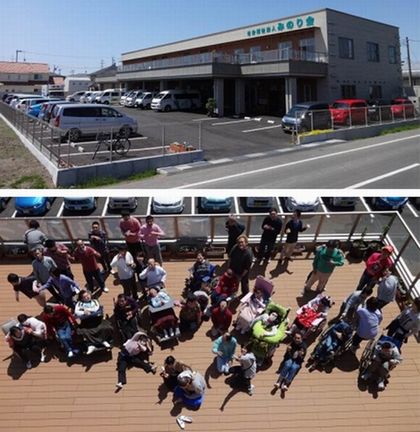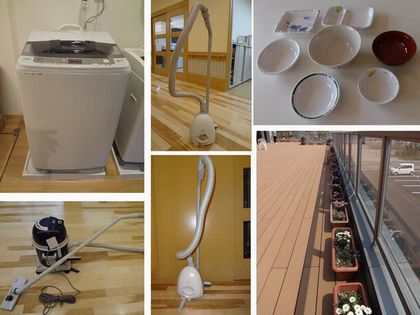Latest Activities Report
KC of Fukushima and Kiwanis Clubs Joint Fund featured in a pamphlet and distributed to
in Fukushima (Part 4)
Feature article on Kiwanis Clubs of Fukushima and Kiwanis Clubs Joint Fund appeared in the pamphlet
published quarterly and 35,000 copies distributed free of charge to parents and schools
in Fukushima Prefecture.
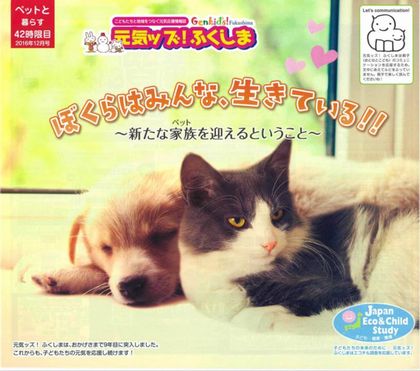
Cover of the December 2016 Issue.
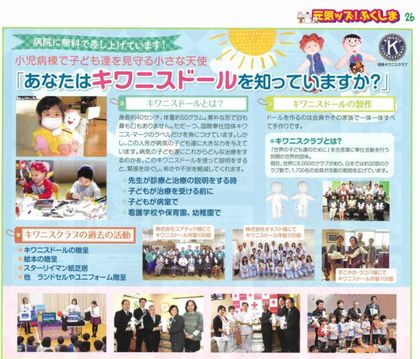
Article on KC of Fukushima's Kiwanis doll activities on p.26.
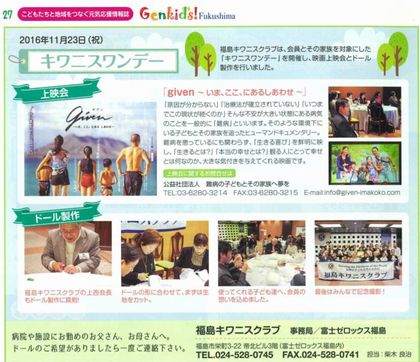
Article on KC of Fukushima's Kiwanis One Day activities (November 23, 2016) on p.27.
Support to the 3.11 Monument Project for the Great East Japan Earthquake and Tsunami
General Incorporated Association "3.11 Monument Project" aims at building a monument
as a place to pray for the victims of the tsunami on March 11, 2011, to preserve the memories and to sympolize hope.
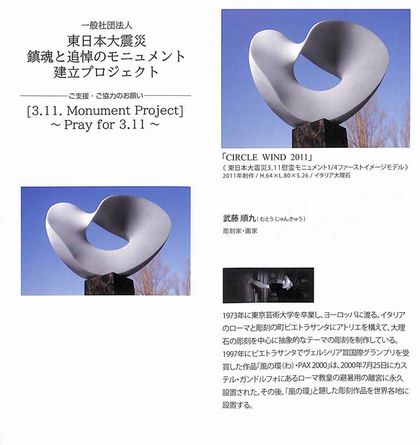
Marble sculpture "Circle Wind" by world-renowned artist Junkyu MUTO will be the monument.
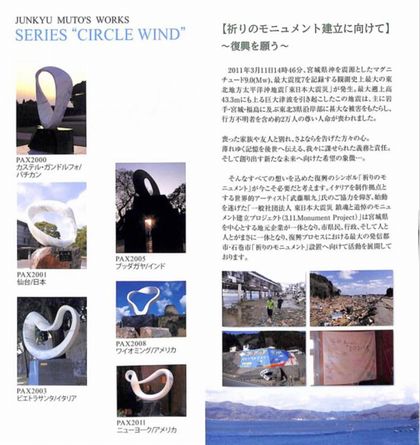
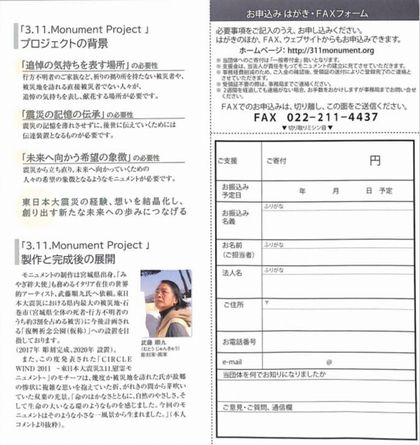
The monument is to be placed at the Memorial Park planned in the Minamihama area of Ishinomaki City,
whose residents comprise 30 percent of the tsunami victims in Miyagi Prefecture.
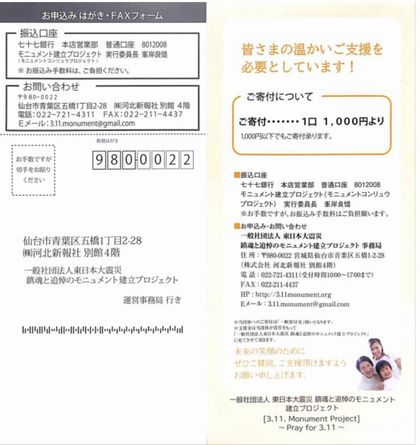
Charity Marathon "Paracup Sendai 2016"at Sendai Airport
PARACUP, Inc. (in Japanese)
organizes charity marathons to provide support to children of the world.
The first charity marathon was held in 2011 in the Tokyo Metropolitan Area.
Every year since 2012, the charity marathon has been held in the tsunami devastated area near Sendai Airport.
(cf. PARACUP Sendai (in Japanese).)
In 2016, it was held on Sunday, October 23 from 10:00 till 15:00.
The funds raised at the marathon will be used to support
children in the tsunami devastated areas.
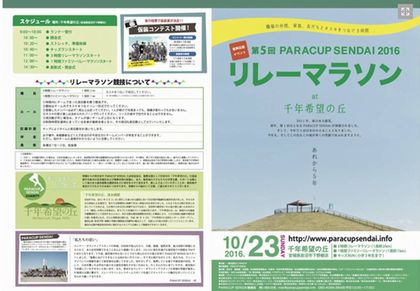
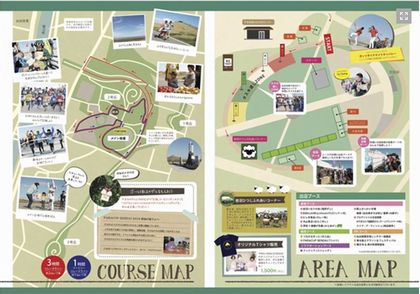
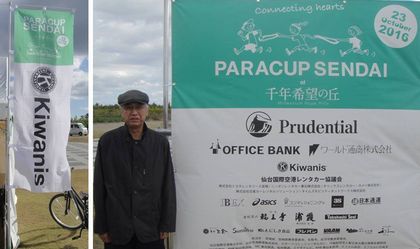
Kiwanis flag as well as the list of sponsors including Kiwanis.
Chairman Yoshiaki SATO of the Kiwanis Clubs Joint Fund was 2015-16 President of the KC of Sendai, and
is 2016-17 Governor-elect of the Kiwanis Japan District.
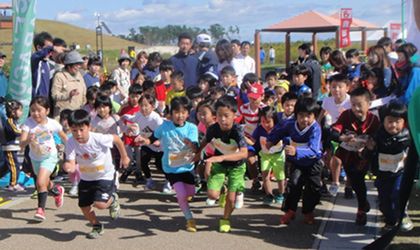
Kids run for children third grader or younger.
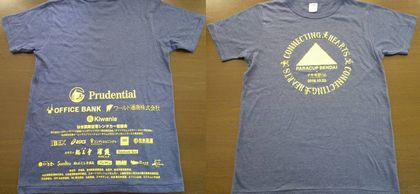
Kiwanis logo among the sponsor list on the back of the official shirts.
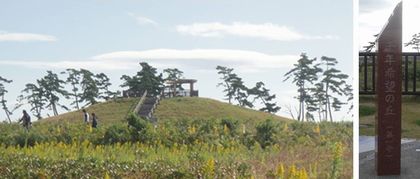
"Millenium Hope Hill No. 1" (8 meters above the sea level),
one of the three hills in the memorial park near Sendai Airport in Iwanuma City,
Miyagi Prefecture. In this area, there used to be communities, which were devastated by the tsunami on March 11, 2011.
The hills are made up of the rubble, and could be used as refuges at future tsunami.
Children's exchange between Kamitomita Town (Wakayama Prefecture) and Soma City (Fukushima Prefecture)
The fourth and the final financial support to Kamitomita Town School Committee (Wakayama Prefecture) for its
Children's Exchange Project in cooperation with Soma City (Fukushima Prefecture), which
has been accepting many people from tsunami-devastated area.
From July 30, 2016 till August 3, ten fifth or sixth graders of Soma City visited Kamitomita Town
and enjoyed the nature and friendship.
Then from August 4 till August 7, eleven fifth or sixth graders, one junior high school student and
two senior high school students of Kamitomita Town visited Soma City, saw the current state of the
tsunami-devastated areas and enjoy friendship.
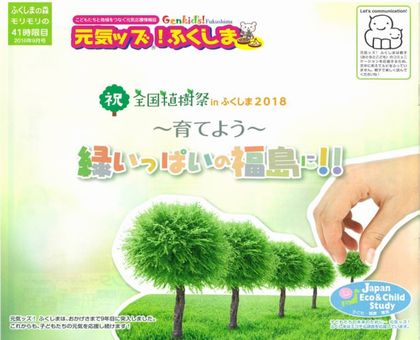
The activities were reported in the September 2016 issue of the pamphlet published quarterly and
35,000 copies distributed free of charge to parents and schools in Fukushima Prefecture.
Kiwanis Clubs Joint Fund provided page charge for Kiwanis activities feature articles.
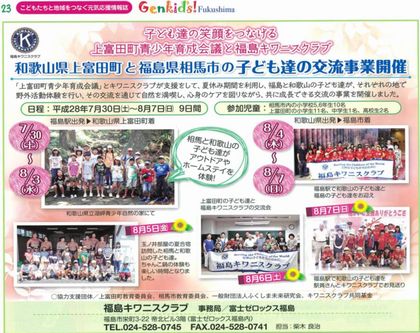
Kiwanis Clubs Joint Fund financially supported the project, while the Kiwanis Club of Fukushima
helped children to enjoy their mutual exchange in Soma City.
Travel expense support to Japan Hospital-clown Association for its activities in Miyagi Prefecture
Japan Hospital-clown Association,
which has been sending clowns to visit sick children at children's hospitals all over Japan,
has also been entertaining children devastated by the Great East Japan Earthquake on March 11, 2011.
Travel expense support for the association to hold one of such events called "Circus at small tent"
at ten locations in Miyagi Prefecture in summer 2016, as it did in 2015 and 2014.
(Proposed by KC of Chiba)
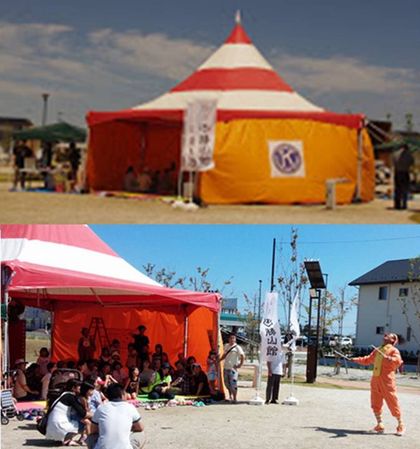
At Tamaura Nishi, Iwanuma City, Miyagi Prefecture (August 14, 2016)
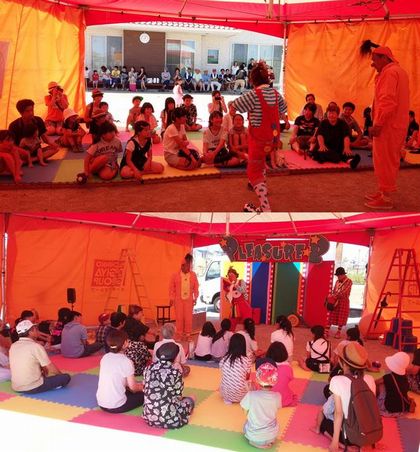
At Tamaura Nishi, Iwanuma City, Miyagi Prefecture (August 14, 2016)
KC of Fukushima and Kiwanis Clubs Joint Fund featured in a pamphlet and distributed to
in Fukushima (Part 2)
Feature article on Kiwanis Clubs of Fukushima and Kiwanis Clubs Joint Fund appeared in the pamphlet
published quarterly and 35,000 copies distributed free of charge to parents and schools
in Fukushima Prefecture.
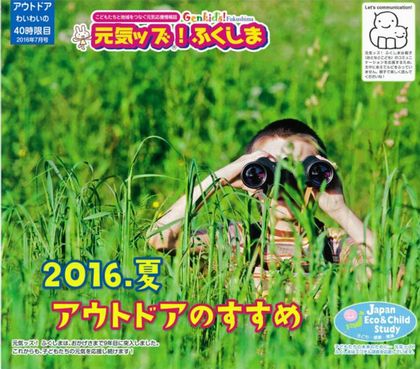
Cover of the Summer 2016 Issue.
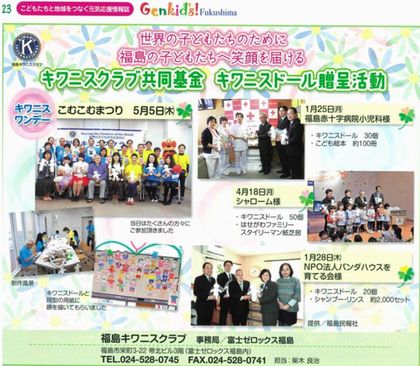
Article on KC of Fukushima and Kiwanis Clubs Joint Fund on p.23.
Piano concert by Kesennuma City children organized by Pianist Reiko AWAZU
World renowned pianist Reiko AWAZU's fourth reconstruction support activity in Kesennuma City, Miyagi Prefecture.
At the time of the Great East Japan Earthquake on March 11, 2011, musical notes on the piano score looked to her like
buds from seeds. She decided to start the series of reconstruction support activities through music
named "Plant seeds of music". This was the twelfth in the series.
She publicly invited children in Kesennuma City who learn to play the piano, selected 11 among them and
gave public lessons to them on July 1 and 2, 2016. On July 3, these children had a valuable experience of
playing the concert grand piano in front of the large audience in the Kesennuma City Auditorium.
(Financial support in collaboration with
Kiwanis Club of Sendai, Children's Fund.)
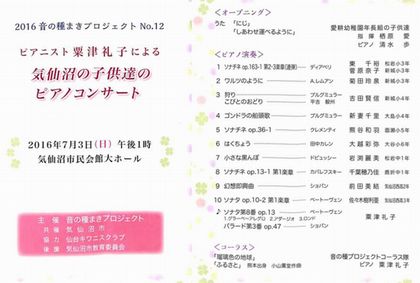
Program
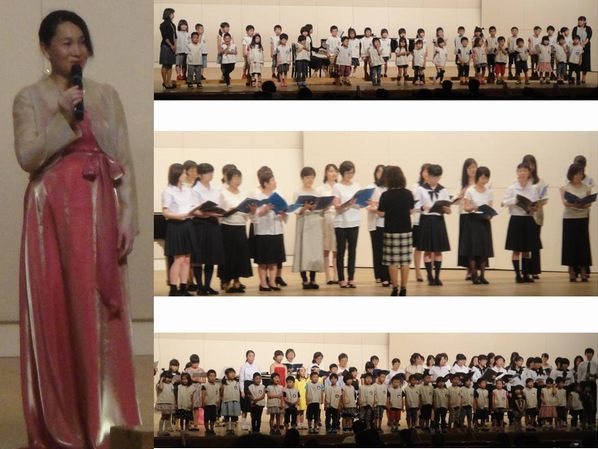
Opening address by Reiko AWAZU, chorus by Aiko Kindergarten kids, chorus by a choir
publicly invited and selected for this occasion
(composed of Kesennuma Senior High School Choir and about 30 citizens),
and chorus by all.
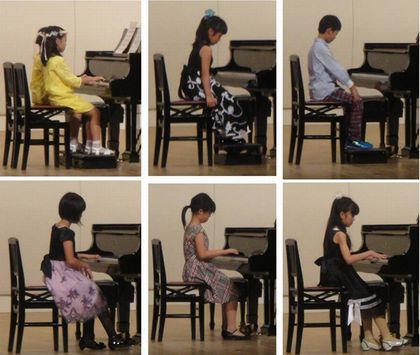
Performances by elementary school children.
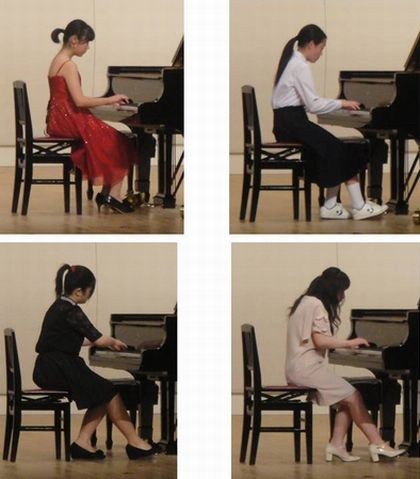
Performances by junior and senior high school students.
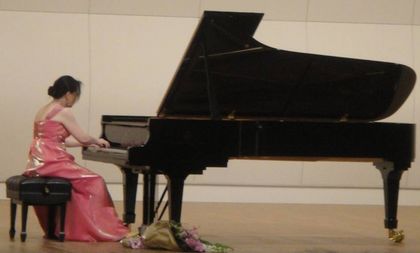
Performance by Reiko AWAZU.
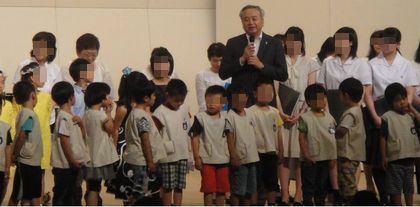
Address by Mayor Shigeru SUGAWARA of Kesennuma City.
"Would like to build bright future for these children, some of whom were born after the Great East Japan Earthquake".
Charity concert for children in Omagari, Akita Prefecture
A charity concert for children was held on April 16, 2016 at Omagari Civic Auditorium in Daisen City,
Akita Prefecture as an event for the first anniversary of the Kiwanis Club of Akita
(under the auspices of Daisen City and Daisen City School Board).
Those children from the areas devastated by the Great East Japan Earthquake were invited.
Expenses (travel for the players, hall rental, poster, etc.) were provided.
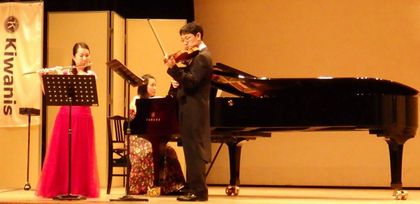
Ranko YOSHIDA (flute), Kazuhisa YOSHIDA (viola and violin), Maya FUKUMURA (piano).
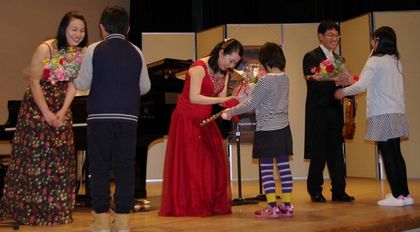
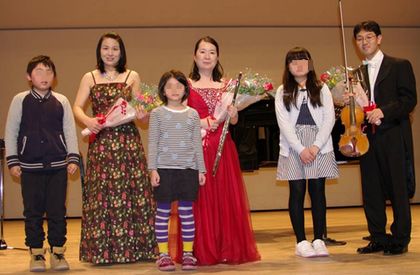
Picture story books and Kiwanis dolls donated to the nursery schools in Date City, Fukushima Prefecture
Many children from the areas devastated by the Great East Japan Earthquake
continue to live in temporary houses in Date City, Fukushima Prefecture.
Many of these children come to the nursery schools run by
Hobara Shalom Academy (in Japanese).
93 picture story books and 40 Kiwanis dolls were donated to the academy for use by these children.
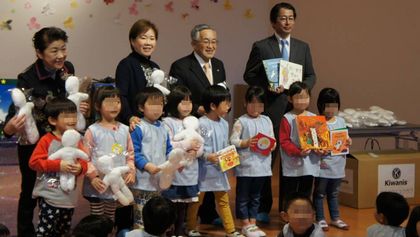
Songs produced and distributed in CD that children now and in the future can remember
the support they received
"Present from Starly man", Inc. produced and distributed in CD to 500 elementary schools,
kindergartens and daycare centers the songs, which children now and in the future can hum and
remember the support Fukushima received after the
Great East Japan Earthquake in March 11, 2011.
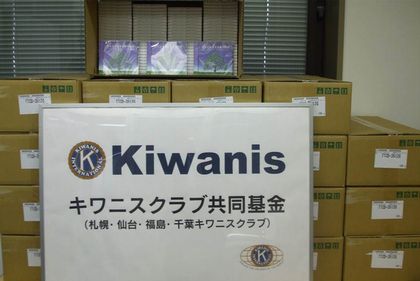
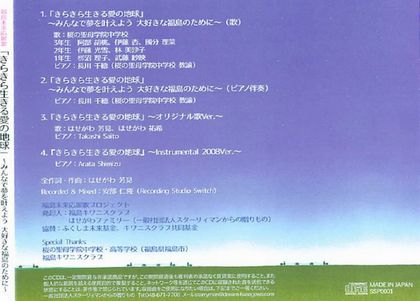
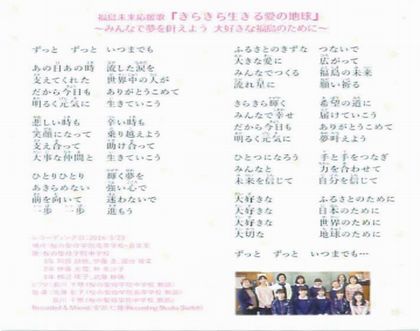
KC of Fukushima and Kiwanis Clubs Joint Fund featured in a pamphlet and distributed to
in Fukushima
Feature article on Kiwanis Clubs of Fukushima and Kiwanis Clubs Joint Fund appeared in the pamphlet
published quarterly and 35,000 copies distributed free of charge to parents and schools
in Fukushima Prefecture.
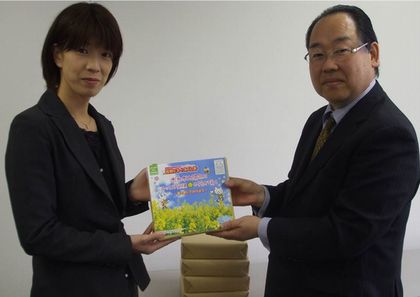
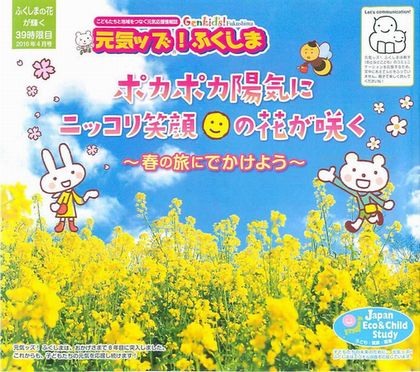
Cover of the April 2016 Issue.
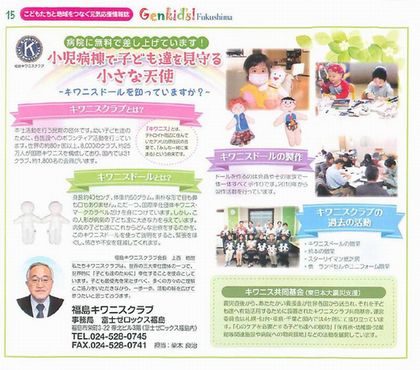
Article on KC of Fukushima and Kiwanis Clubs Joint Fund on p.15.
Support to "The Sixth 3.11" anniversary in Sapporo City of the Great East Japan Earthquake
On March 11, 2016 and the day before, about 5,000 people took part in the event held in the underground
mall in front of Sapporo Railway Station. It commemorated the "sixth 3.11" since
the Great East Japan Earthquake exactly five years ago. The aim of the event was to report how people continue
to suffer in the communities devastated by the earthquake and tsunami.
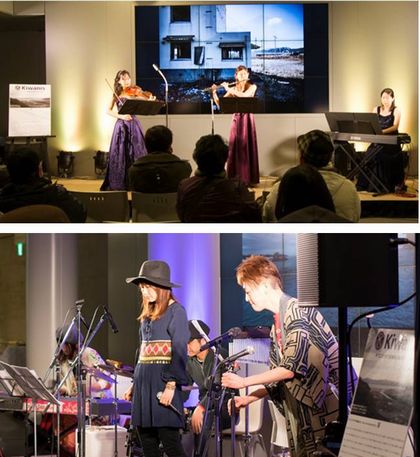
Performances by musicians who have been providing support.
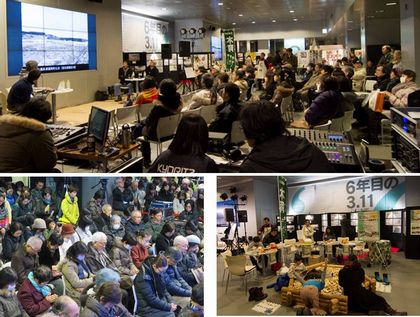
Symposium, silent prayer and wooden toys made from wood produced in Hokkaido.
Children invited to the music festival in Sapporo City, Hokkaido
150 children and their families from areas devastated by the Great East Japan Earthquake
who continue to live in Sapporo City and its vicinity were invited to
the music festival on January 21, 2016 held by a group of young professional musicians in Sapporo City.
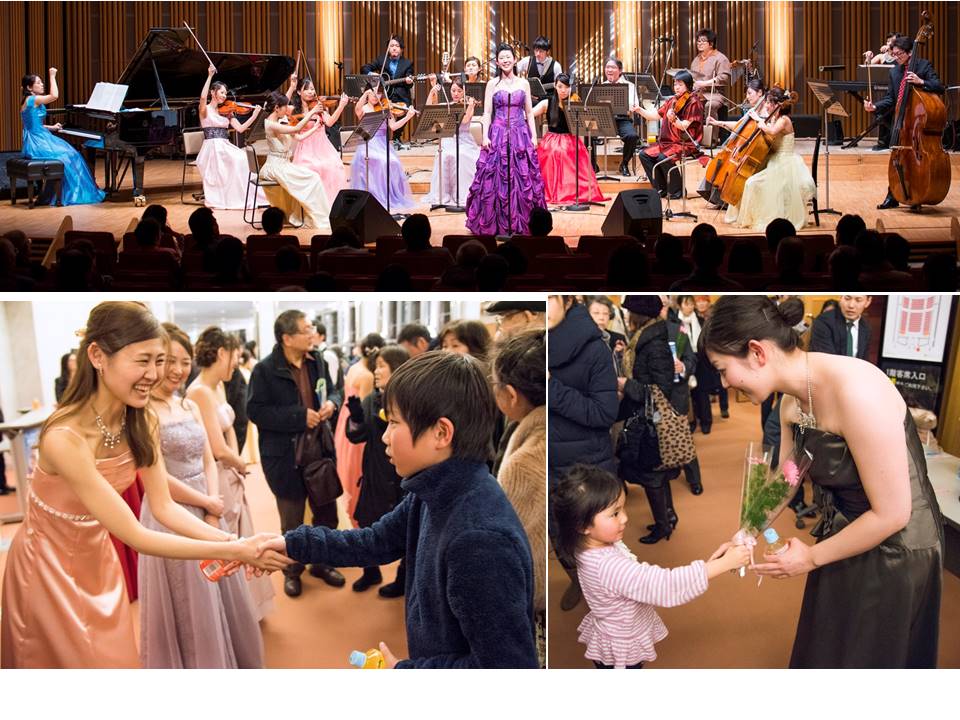
Children invited to a Christmas Trio Concert in Ebetsu City, Hokkaido
The expenses were provided to the NPO "Ebetsu Musuic Lovers, Inc." to invite
children and their parents (80 altogether) who were affected by the Great East Japan Earthquake
and continue to live in Ebetsu City, Sapporo City and Higashi Hiroshima City in Hokkaido
to Ebetsu Civic Auditorium on December 22, 2015 to enjoy a trio concert
by world renowned violinist, cellist and pianist.
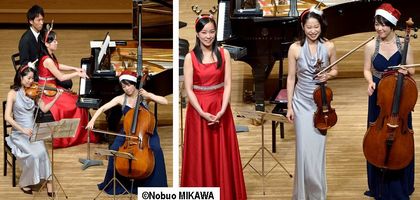
Tamaki KAWAKUBO (violin), Mari ENDO (cello), Yurie MIURA (piano)
Presents for children hospitalized at Japanese Red Cross Fukushima Hospital
Due to the damage caused by the Great East Japan Earthquake on March 11, 2011,
Japanese Red Cross Fukushima Hospital (in Japanese)
in Fukushima City needs to move to a new building to be completed in May 2018.
Together with 30 Kiwanis dolls, we present picture books and toys, which the hospital has difficulty
in purchasing due to lack of fund.
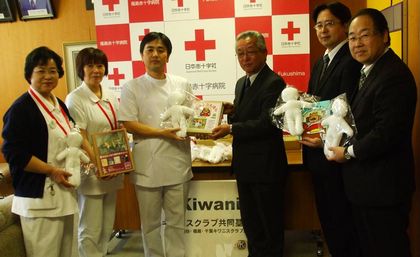
Presents for children hospitalized for a long period at Fukushima Medical University Hospital
DVD and blue ray disks together with 50 Kiwanis dolls were presented to children hospitalized for a long period
at the Pediatrics Department of Fukushima Medical University Hospital.
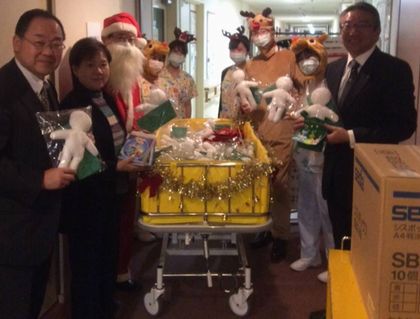
Fukushima children invited to Yonezawa to fully enjoy outdoor activities
Children in some parts of Fukushima continue to have only limited access to outdoor activities
for fear of possible radiation from the Fukushima Daiichi Nuclear Plant damaged by the
Great East Japan Earthquake. Team Ohnuki invited these children to "The House of Memories" in Yonezawa City,
Fukushima Prefecture so that they can freely enjoy outdoor activities.
Kiwanis Clubs Joint Fund provided financial support for their travel.
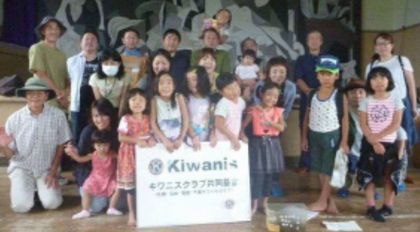
The first group of 25 participants (11 kids aged 4 through 11, 6 parents, 8 members of staff) took part
in the trip on October 10--12, 2015.
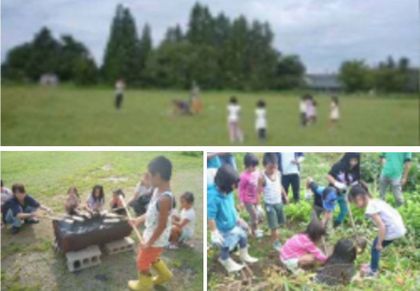
The kids enjoyed outdoor activities.
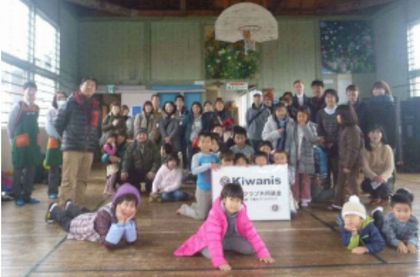
The second group of 55 participants (33 kids aged 0 through 11, 22 parents, 9 members of the staff) took part
in the trip on November 28--29, 2015.
Financian support to Yuriage Junior High School, Natori City, Miyagi Prefecture
Yuriage Community along the Pacific Coast of Natori City, Miyagi Prefecture was devastated by the tsunami
on March 11, 2011.
Yuriage Junior High School was directly hit by the tsunami, and has been giving classes in temporary school
buildings inland. The old school buildings are demolished starting from December, 2015 in preparation for
the neighboring area to be raised. A new school for combined elementary and secondary education
is scheduled to be opened in April, 2018.
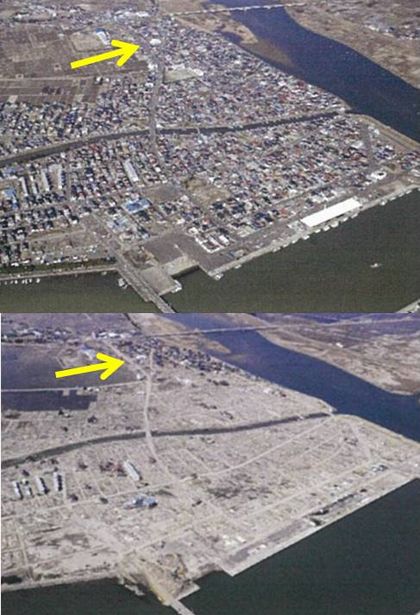
Yuriage Community devastated by the tsunami.
(Before and after the tsunami, with the arrows pointing at the Yuriage Junior High School.)
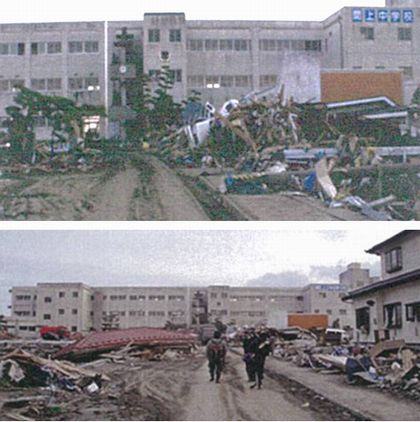
Tsunami devastation near Yuriage Junior High School.
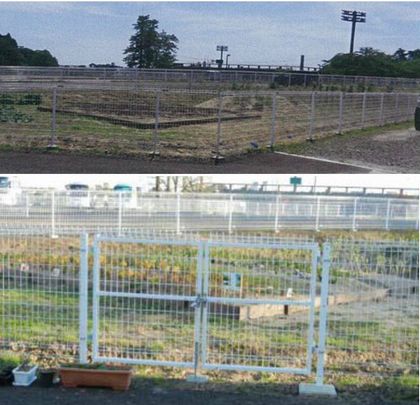
Our financial support was used to build a gate to the fence separating the temporary school ground
from the neighboring flowerbed.
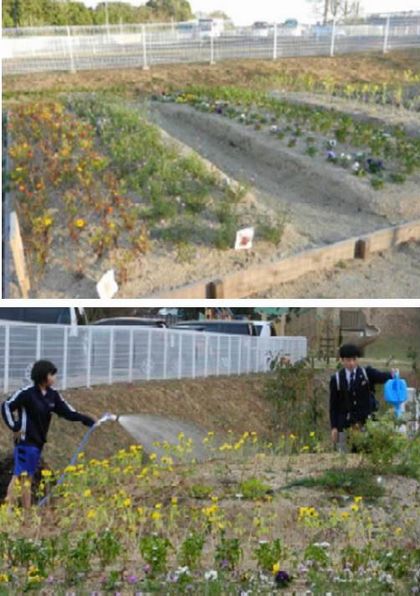
Students tending the flowerbed.
Charity Marathon "Paracup Sendai 2015"at Sendai Airport
PARACUP, Inc. (in Japanese)
organizes charity marathons to provide support to children of the world.
The first charity marathon was held in 2011 in the Tokyo Metropolitan Area.
Every year since 2012, the charity marathon has been held in the tsunami devastated area near Sendai Airport.
(cf. PARACUP Sendai (in Japanese).)
In 2015, it was held on Sunday, October 25 from 10:00 till 15:00.
The funds raised at the marathon will be used to support
children in the tsunami devastated areas.
As in 2014, we provided support in collaboration with
KC of Sendai, Children's Fund.
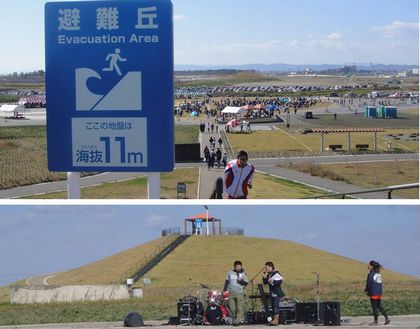
One of the three "Millenium Hope Hills" in the memorial park near Sendai Airport in Iwanuma City, Miyagi Prefecture.
In this area, there used to be communities, which were devastated by the tsunami on March 11, 2011.
The hills are made up of the rubble, and could be used as refuges at future tsunami.
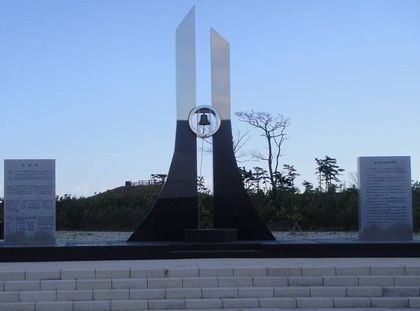
The memorial monument in the park.
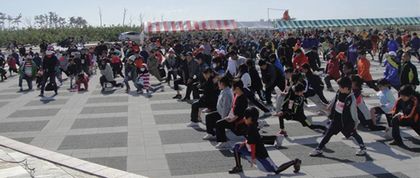
Warm-up exercises by the participants.
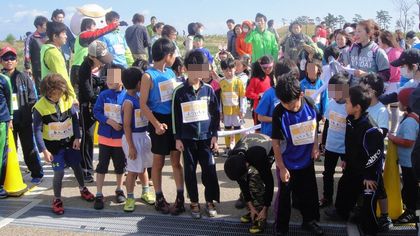
At the starting line for the 200 meter run for children under third graders.
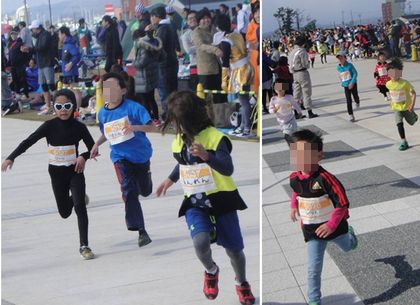
The goal for the 200 meter runs for first through third graders as well as for preschoolers.
Financial support of the "Very Special Music Festival" in Fukushima City
The
Very Special Music Festival (in Japanese)
held in Fukushima City on September 23, 2015 is a music festival in town in which
many children and people with disabilities also perform.
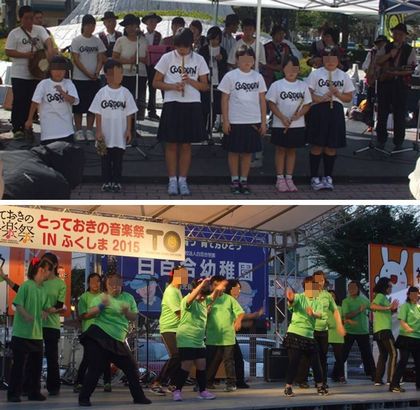
Kiwanis International Foundation President-elect-designate visited areas devastated by the tsunami
on March 11, 2011
Kiwanis International Foundation President-elect-designate Hwang Chia Sing of Malaysia visited
areas on September 5--8, 2015 devastated by the tsunami after attending the 39th Japan District Convention
held on September 4, 2015 in Omiya.
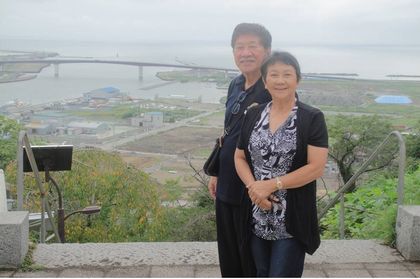
At Hiyoriyama in Ishinomaki City, Miyagi Prefecture.
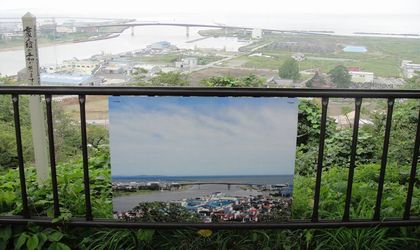
View before and after the tsunami on March 11, 2011.
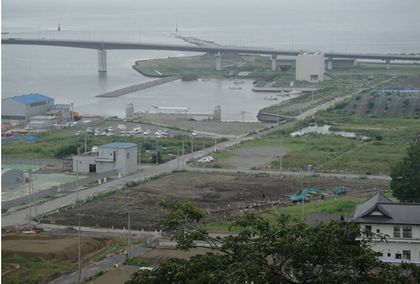
Current state of Minamihama-cho, Ishinomaki City.
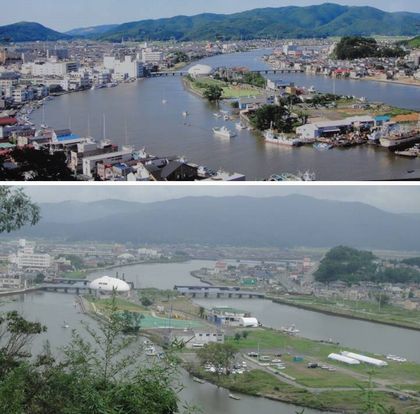
View before and after the tsunami of Nakase, Ishinomaki City.
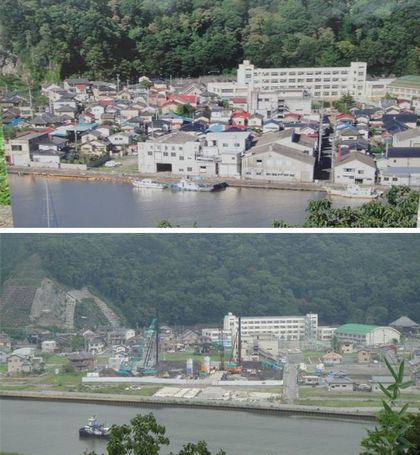
View before and after the tsunami of Minato-cho, Ishinomaki City.
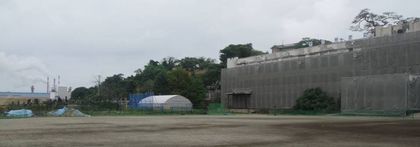
Former Kadonowaki Elementary School (in Ishinomaki City) hit and burned by cars swept away by the tsunami.
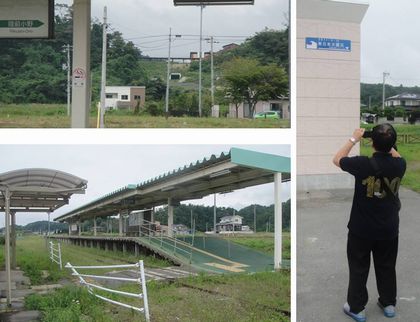
Former Nobiru Station building in Higashimatsushima City, Miyagi Prefecture devastated by the tsunami on
March 11, 2011.
The new building was built on the hill behind and began operation on May 30, 2015.
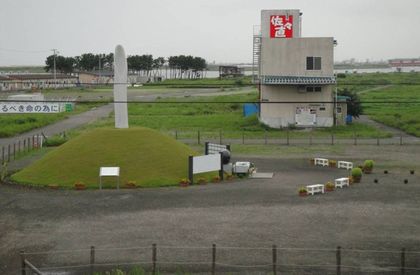
The monument in Yuriage, Natori City, Miyagi Prefecture. The tsunami reached the height of the monument.
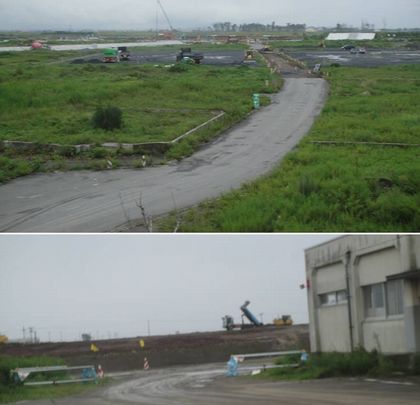
Former building and the vicinity of Yuriage Junior High School.
The building and that of the near-by Yuriage Elementary School will be demolished in the fall, 2015.
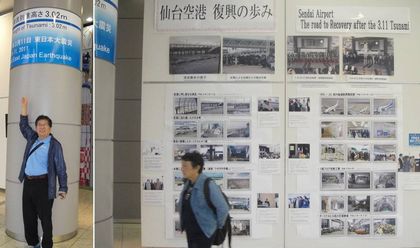
Sendai Airport was devastated by the tsunami, but re-started its operation four months later.
Travel expense support to Japan Hospital-clown Association for its activities in Miyagi Prefecture
Japan Hospital-clown Association,
which has been sending clowns to visit sick children at children's hospitals all over Japan,
has also been entertaining children devastated by the Great East Japan Earthquake on March 11, 2011.
Travel expense support for the association to hold one of such events called "Circus at small tent"
at eight locations in Miyagi Prefecture in summer 2015, as it did in 2014.
(Proposed by KC of Chiba)
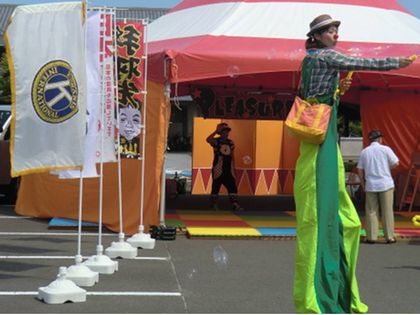
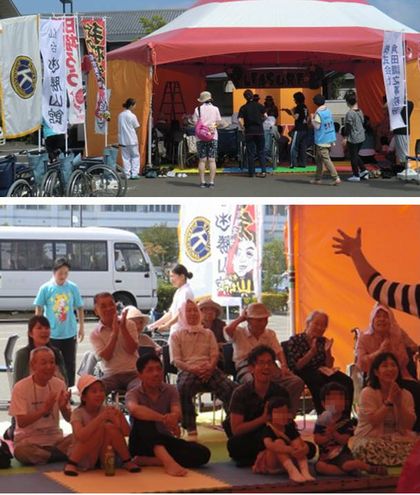
In Iwanuma City, Miyagi Prefecture (August 9, 2015).
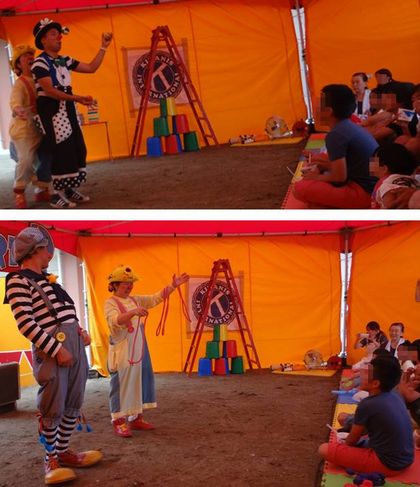
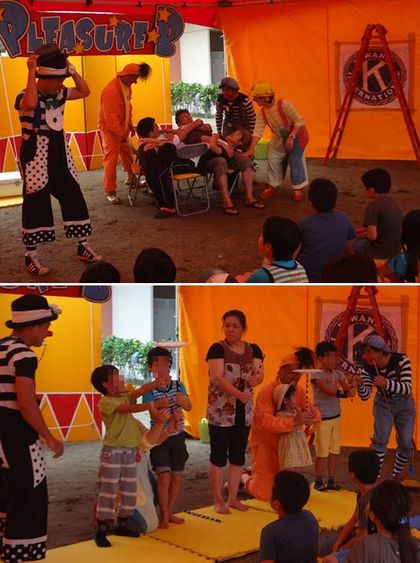
At a public housing area for afflicted families in Tagajo City, Miyagi Prefecture (August 16, 2015).
"Picture Book World in Fukushima" held in Koriyama City, Fukushima Prefecture
Children in Fukushima cannot play freely outdoors due to possibly radiation from the nuclear
power plant devastated by the Great East Japan Earthquake on March 11, 2011.
To promote book reading to these children, "Picture Book World in Fukushima" has been held
since 2013 at the convention site "Big Palette Fukushima" in Koriyama City, Fukushima Prefecture.
5,800 (in 2013), 7,200 (in 2014) and 8,000 (in 2015) children took part. In 2015, the event was held
on August 15 and 16.
KC of Fukushima supported the event, and set up a booth on August 15.
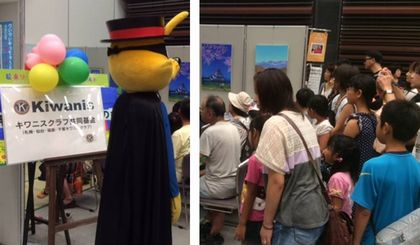
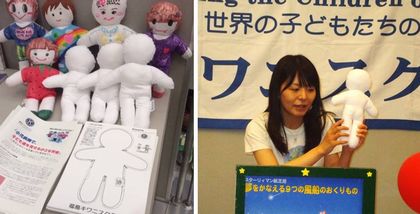
Kiwanis activities explained (August 15, 2015).
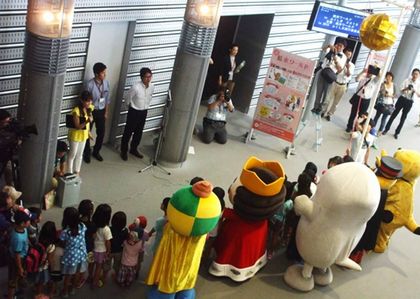
"Fukushima Kids Fair" held in Fukushima City, Fukushima Prefecture
Obesity is a serious problem for children in Fukushima, since they cannot play freely outdoors
due to possible radiation from the nuclear power plant devastated by the Great East Japan Earthquake
on March 11, 2011. For these children, "Fukushima Kids Fair" has been held since 2012 at
Aduma Gymnastic Hall in Fukushima City, Fukushima Prefecture. 36,000 (in 2012), 24,000 (in 2013),
27,000 (in 2014) and 30,000 (in 2015) children took part. In 2015, the Fair was held on
August 8 and 9.
KC of Fukushima supported the Fair and set up a booth on August 9.
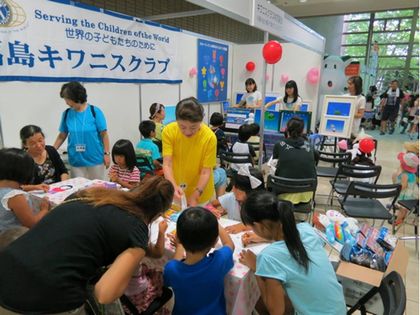
KC of Fukushima set up a booth on August 9, 2015 and publicized Kiwanis activities.
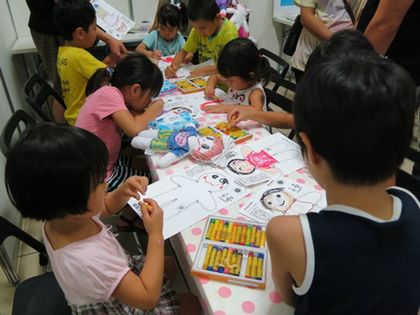
Children enjoyed coloring the patterns of Kiwanis dolls.
Children of Fukushima sent to Shibata City, Niigata Prefecture
Children (50 including some parents) of Fukushima Prefecture are sent to Shibata City, Niigata Prefecture
(from July 29 to 31, 2015) to enjoy outdoor activities on the beach. Support of bus charter fee, etc.
(We provided support in summer 2014 as well.)
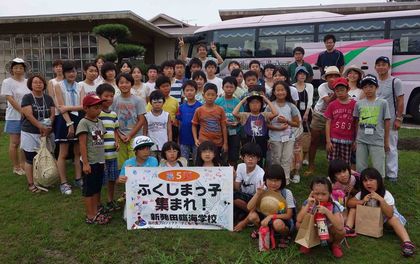
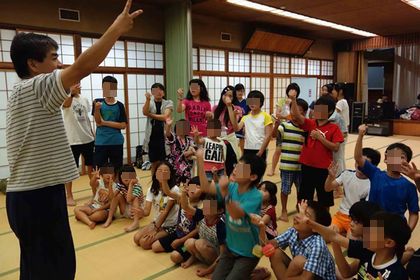
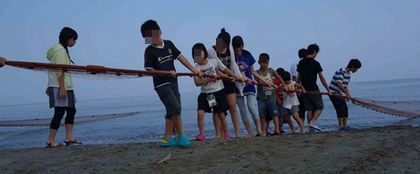
Children of Soma City, Fukushima Prefecture sent to Kami Tomita Town, Wakayama Prefecture
25 children of Soma City, Fukushima Prefecture are sent to Kami Tomita Town, Wakayama Prefecture
(from July 27 to August 3, 2015) to enjoy outdoor activities that are not so easy at home.
Support of bus charter fee, etc. (We provided support in summer 2014 as well.)
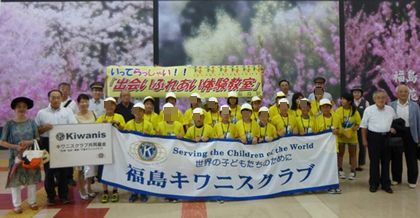
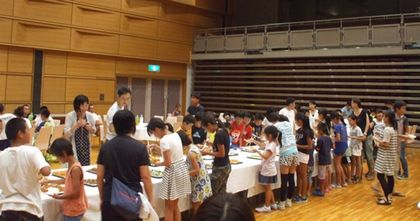
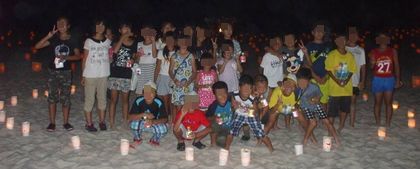
A large clock for the Children's Dome in Soma City, Fukushima Prefecture
Many families from coastal areas of Fukushima Prefecture continue to live in temporary housing in Soma City.
Children's Dome was built for children so that they don't have to play outdoors.
Soma City needed a large clock for the dome.
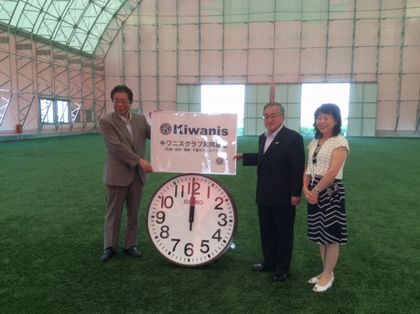
Mayor TATEYA of Soma City receiving the large clock from President JONISHI and Immediate Past President
WAGO of the KC of Fukushima.
(July 21, 2015)
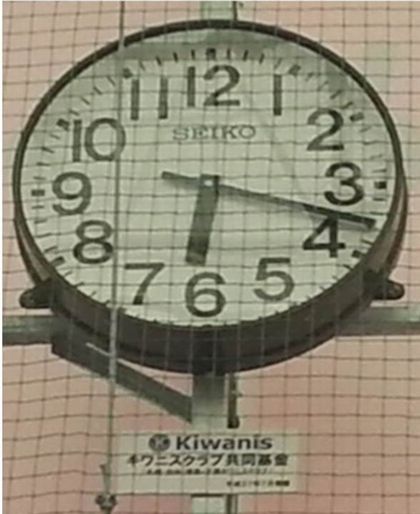
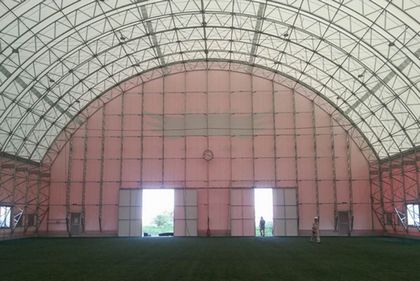
Children's books and play equipment for Aduma Nursery in Fukushima City, Fukushima Prefecture
Aduma Nursery built in April 2015 a center for 40 children with disabilities. It accepts children
from northern part of the prefecture. KC of Fukushima donated fund for about 100 books and play equipment
for the center. It also donated 30 Kiwanis dolls.
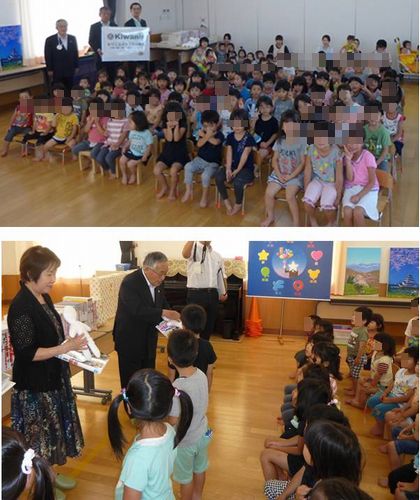
Children's books for Ohara Hospital in Fukushima City, Fukushima Prefecture
Ohara Hospital in Fukushima City is one of the major hospitals in Fukushima Prefecture, and
accepts many children from the northern part of the prefecture.
The hospital buildings were damaged by the Great East Japan Earthquake, and new buildings are expected
to be complete in 2017. KC of Fukushima donated fund for about 100 books and DVD's badly needed by the pediatrics
department, and also donated 30 Kiwanis dolls.
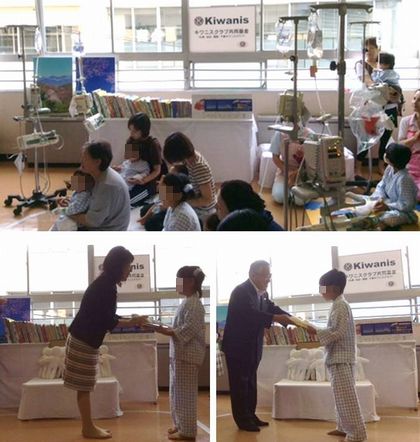
Activities Report 6
Ground raising construction in Shizugawa, Minamisanriku Town, Miyagi Prefecture
Shizugawa Community was devastated by the tsunami on March 11, 2011. Surrounding hill areas are being
scraped away for housing and road, while low-lying areas are being raised.
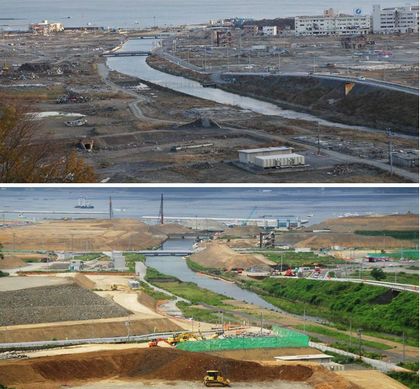
The photo above taken in November 2011, while the photo below taken in July 2015.
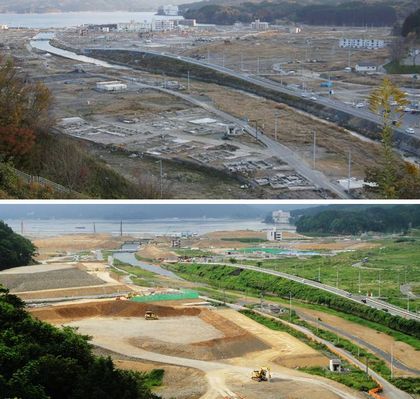
The photo above taken in November 2011, while the photo below taken in July 2015.
Appreciation to Kiwanis was expressed in Marumori Town, Miyagi Prefecture
On May 9, 2015, 22 members, family and friends of the Kiwanis Club of Sendai visited Marumori Town, Miyagi Prefecture.
They met and had a good time with the 11 members of Sennan Satellite located in the community.
The Kiwanis support so far to Marumori Junior High School in Marumori Town, Miyagi Prefecture, which was newly built
in place of the four junior high schools in the community devastated by the Great East Japan Earthquake on March 11, 2011.
- (January, 2012) Repair and purchase of instruments for the school's brass band.
(Jointly by Kiwanis Clubs Joint Fund, KC of Sendai, Children's Fund, and Bikki Organization Miyagi)
- (August, 2012) Equipment and goods (soccer goals, soccer balls, basketballs, tennis balls, judge's stand, etc.)
for sports clubs of the school. (Kiwanis Clubs Joint Fund)
- (March, 2013) Financial support for re-drawing of two basket ball courts due to the change of rules.
(KC of Sendai, Children's Fund)
- (April, 2015) Pre-paid book coupon cards with Kiwanis logo for students of the school's brass band.
(KC of Sendai, Children's Fund)
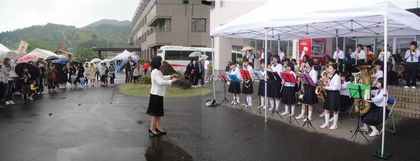
Visitors from the Kiwanis Club of Sendai were welcomed by Marumori Junior High School Brass Band at the fair
"Marumori Market" held near the town hall.
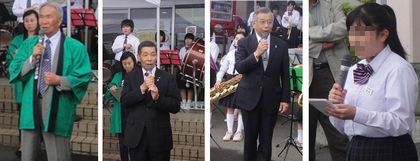
President Kaoru AKIBA of Sennan Satellite gave a welcome speech.
Appreciation to Kiwanis was expressed by Mayor Hoshina of Marumori Town, Principal Sato of
Marumori Junior High School and a member of the Marumori Junior High School Brass Band.
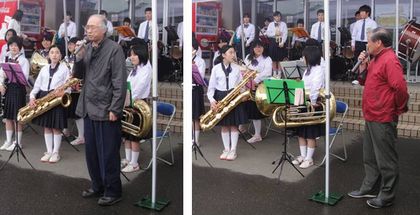
Speech and introduction to Kiwanis by Chairman Yoshiaki SATO of Kiwanis Clubs Joint Fund Steering Committee
as well as President Seiichi AGATSUMA of the Kiwanis Club of Sendai
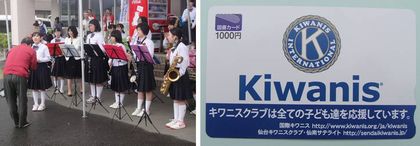
President AGATSUMA of the KC of Sendai presented pre-paid book coupon cards to the members of
Marumori JHS Brass Band.
Travel expense support for internationally renowned pianist Reiko AWAZU, for her music program series for Tohoku
in Kesennuma City, Miyagi Prefecture
Ms. Awazu has been giving piano concerts to people devastated by the earthquake and tsunami on March 11, 2011.
Even after four years, many people still live in temporary houses in Kesennuma City, Miyagi Prefecture.
On March 27, 2015, the concert held at a city community center branch was attended by about 80 people, many of whom
live in temporary houses nearby.
On March 28, 2015, another concert was held at the city community center.
Again those living in the temporary houses nearby attended.
Both concerts lasting about two hours had two parts: In the first part,
Ms. Awazu played piano classics by Chopin, Beethoven, etc.
The second part started with stretching and vocal exercises.
The participants then sang favorite songs with accompaniment by Ms. Awazu.
These two parts provided the participants with great healing experiences.
Ms. Awazu also brought encouraging messages from Japanese class students of Nishimachi International School in Tokyo.
The participants wrote answering messages.
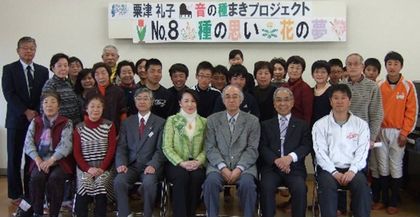
After the miniconcert at a community center branch on March 27.
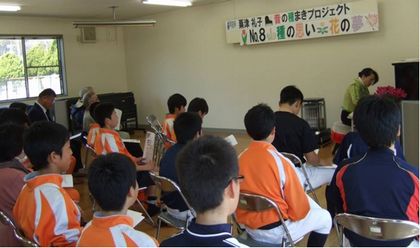
The miniconcert at the community center on March 28.
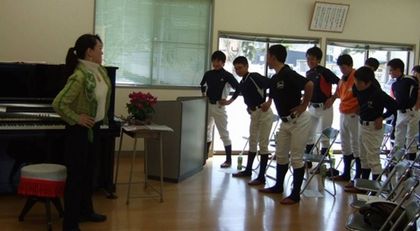
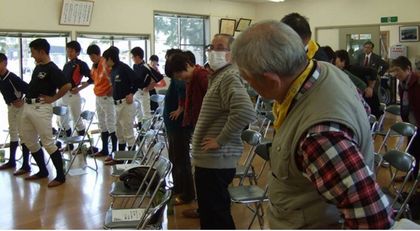
Stretching and vocal exercises after the first part in preparation for the singing in the second part.
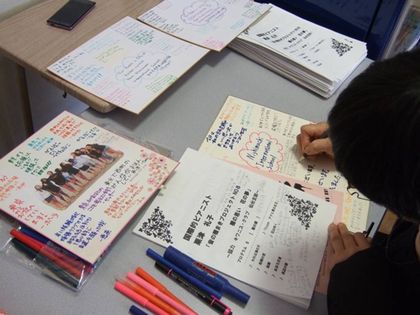
Participants wrote answering messages to the encouraging messages from Japanese class students at Nishimachi
International School in Tokyo.
Support to "The Fifth 3.11" anniversary in Sapporo City of the Great East Japan Earthquake
On March 11, 2015 and the day before, about 6,000 people took part in the event held in the underground
mall in front of Sapporo Railway Station. It commemorated the "fifth 3.11" since
the Great East Japan Earthquake exactly four years ago. The aim of the event was to report how people continue
to suffer in the communities devastated by the earthquake and tsunami.
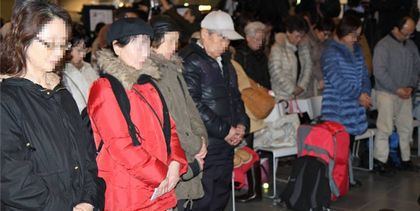
Silent prayer for the victims at 2:46 pm on March 11, 2015, exactly the time the earthquake took place four years ago.
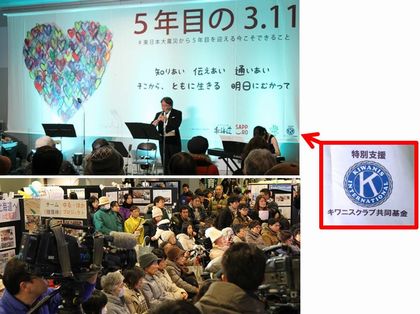
Musical performance by musicians who have been visiting the communities devastated by the earthquake and tsunami.
The backdrop contained the logo of "Kiwanis Clubs Joint Fund" as one of the sponsors.
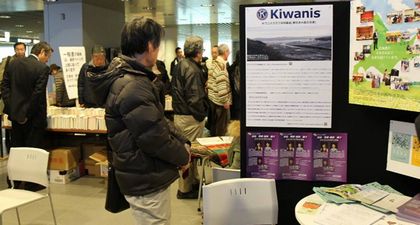
Poster explaining the Kiwanis activities. The book sharing booth in the back.
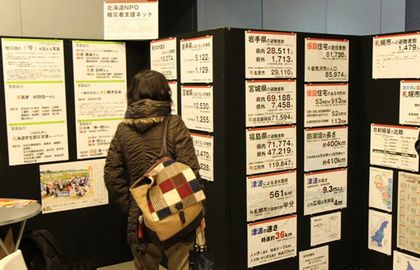
Report on the devastation caused by the earthquake and tsunami.
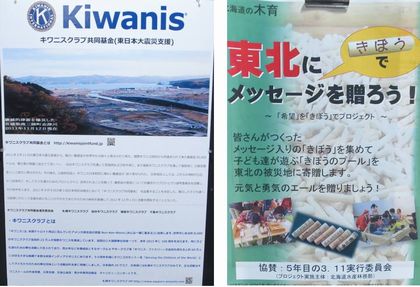
Poster on Kiwanis and call for wood-carved messages for children in the devastated communities.
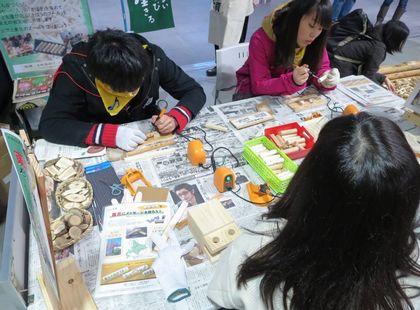
Children carving messages on wood for children in the devastated communities.
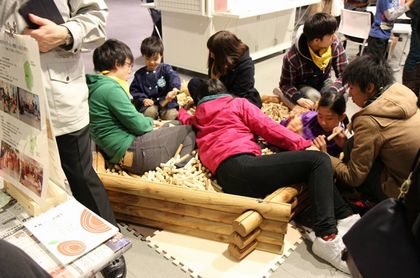
Wooden toys made from wood produced in Hokkaido.
Enhancement of children's audio-visual environment at the Pediatrics Department of Fukushima Medical University
For the enhancement of the children's audio-visual environment of the Pediatrics Department
of Fukushima Medical University, two Apple iPads, a blue ray disk player and others were
donated in addition to usual 50 Kiwanis dolls.
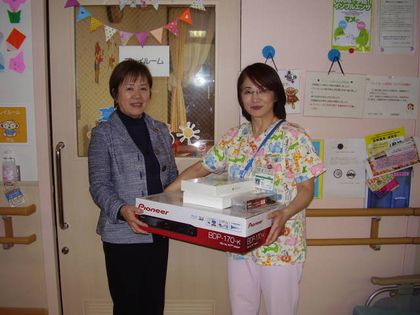
Financial support to the Futsal Competition organized by Sendai City Sports Promotion Foundation
Since the earthquake and tsunami 4 years ago on March 11, 2011, many children came to live in
Sendai City. "Shellcom Sendai" operated by Sendai City Sports Promotion Foundation has been
organizing sports events for those children. The 12th Futsal Competition was organized
on March 8, 2015. Eight teams took part. Each team was composed of 5 to 10 members
from one or multiple families. At least two children in elementary school or younger and at least two
players in high school or older needed to be at play all the time. The goalkeeper had to be in
high school or older. The Kiwanis Clubs Joint Fund provided JPY 200,000 to support this competition.
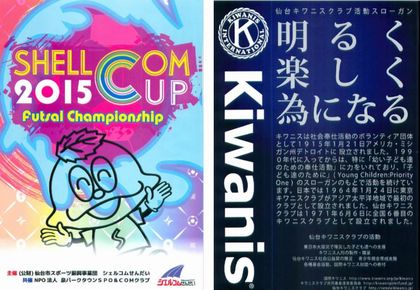
The cover of the program. On its back was the description of the Kiwanis Club of Sendai.
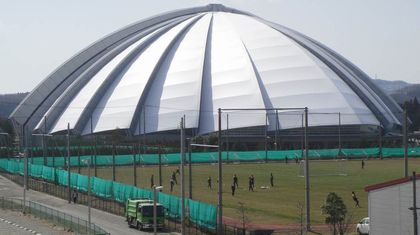
Indoor sports ground "Shellcom Sendai".
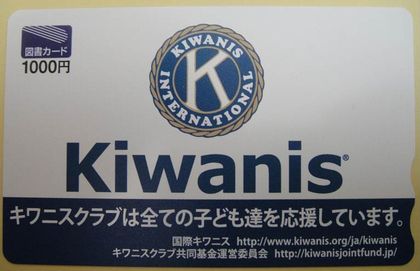
Each participant received a 1,000 Yen pre-paid book coupon card with Kiwanis logo.
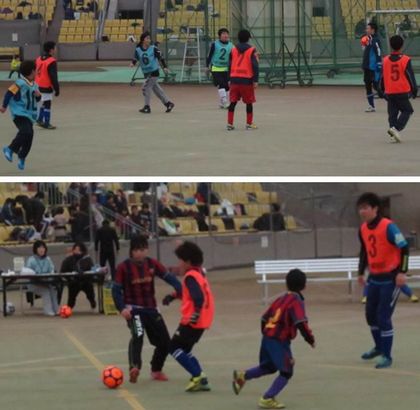
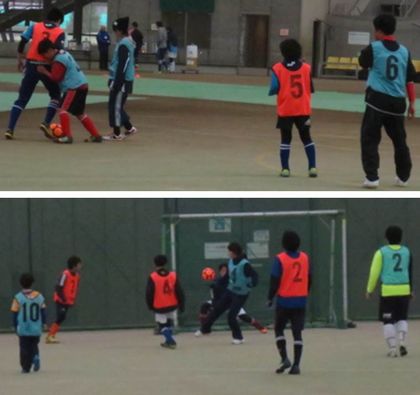
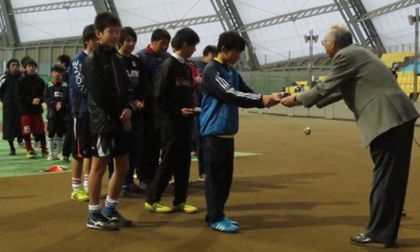
The winning teams received awards from Chairman Yoshiaki SATO of the Kiwanis Clubs Joint Fund.
Baseball equipment for Nobiru Boys Baseball team in Higashi Matsushima City, Miyagi Prefecture
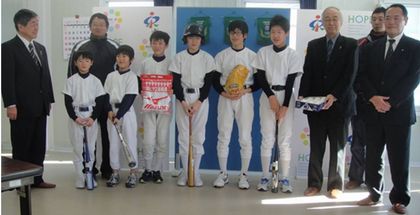
Due to flu epidemic, only 6 out of the 15 members of the Nobiru Boys Baseball team could come
to the presentation ceremony on January 31, 2015.
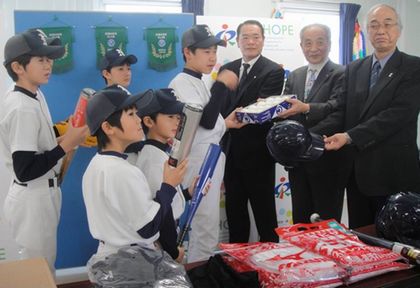
In addition to baseball equipment including mitts, balls, bats, helmets, and team shirts,
we also presented the team with backstop, net and scoreboard.
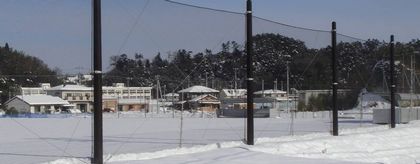
The baseball ground, which the members of the team helped leveling,
since the ground of Nobiru Elementary School (the white building in the back near the forest)
was devastated by the tsunami on March 11, 2011. The backstop, net and scoreboard are
used here, although it is hard to see them in the photo due to the snow of 25 centimeters (10 inches)
that fell on the day before our visit.
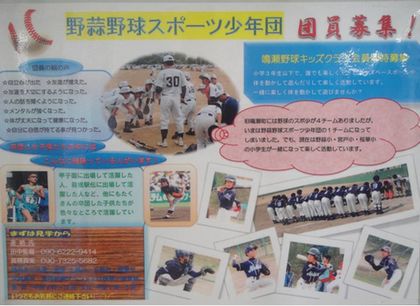
A poster recruiting new members of the team. One of the former members of the team
is explained to have been a well-known player at the nationwide highschool baseball tournament.
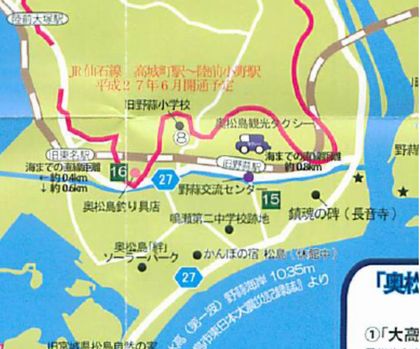
(The Nobiru Community map that is a part of the brochure on the tsunami and earthquake disaster
compiled by Higashi Matsushima City Library)
The 10 meter (over 10 yard) high tsunami on March 11, 2011 reached the curve in red and devastated
the Nobiru Community in Higashi Matsushima City.
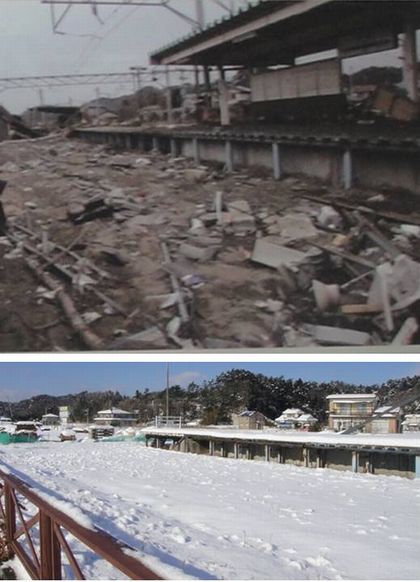
(The top photo taken immediately after the tsunami disaster is a part of the exhibit
at Nobiru Community Center located at the old Nobiru Station building of the Senseki Railroad Line.
The bottom photo was taken on January 31, 2015.)
Great East Japan Earthquake and Tsunami Archive compiled by Higashi Matsushima City School Committee
and Library
records the devastation suffered by Higashi Matsushima City.
The photo collection in pdf files
enables you to see the disaster in spite of the captions in Japanese,
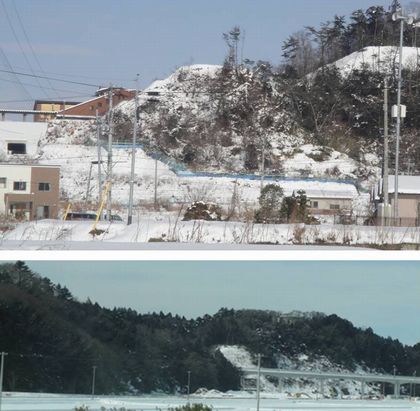
The Senseki Railroad Line (the curve colored with alternating white and brown) was
devastated by the earthquake and tsunami between Takagi-machi Station and Rikuzen-Ono Station
and is partly served by bus.
The old Nobiru Station is near the car mark along the railroad curve.
The new railroad track was just completed on higher ground to the north of the old track.
The new Senseki Railroad track will star its service on May 30, 2015 and will connect
Sendai City and Ishinomaki City directly without change to bus.
The photo shows the new Nobiru Station built on the hill north of the old Nobiru Station,
as well as the elevated railroad track coming out of the new station.
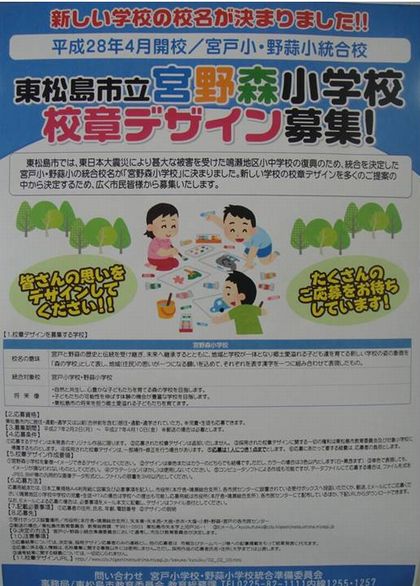
Miyato Elementary School and Nobiru Elementary School (marked "8" on the map) in the Community were
devastated by the earthquake and tsunami, and currently have classes in temporary buildings.
In April, 2016, these elementary schools will be merged and will be called Miya-no-mori
Elementary School, using "miya" and "no" characters from the respective former elementary schools.
The poster calls for proposed logo of the new elementary school.
Activities Report 5
Disaster mitigation education for fifth graders
International Research Institute
of Disaster Science, Tohoku University
has been providing "Education for Disaster Mitigation" to fifth graders in Miyagi Prefecture
(about 20,800 of them in Miyagi Prefecture alone)
and neighboring areas with practical lessons on how to avoid or mitigate disasters such as
those encountered at the Great East Japan Earthquake on March 11, 2011.
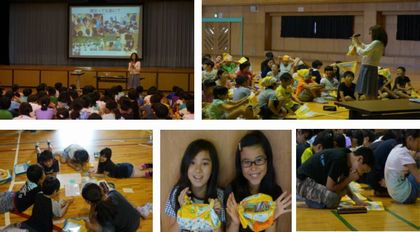
The project team visits elementary schools to conduct "disaster mitigation classes" for fifth graders.
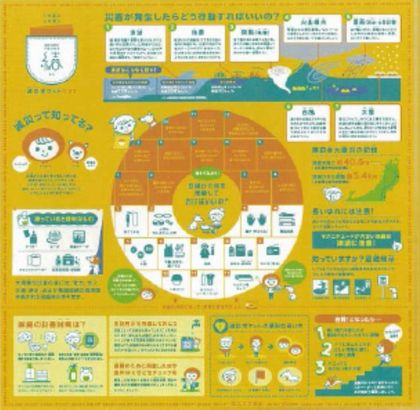
Each fifth grader is provided with handkerchief full of practical information on how to avoid or mitigate
disasters.
Children invited to the 3rd Mayumi Concert in Sapporo
Mayumi OHIRA, concert master of Sapporo Philharmonic Orchestra produces Mayumi Concerts three times a year.
30 children each time (90 children in total) from Fukushima living in Sapporo will be invited to the
concert.
The third concert was held on November 27, 2014.
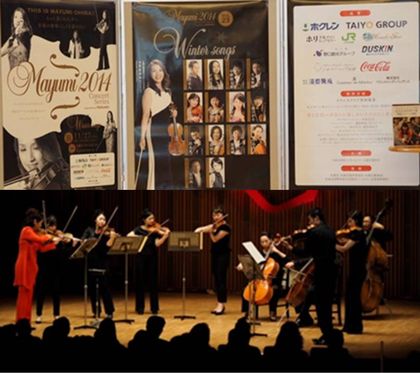
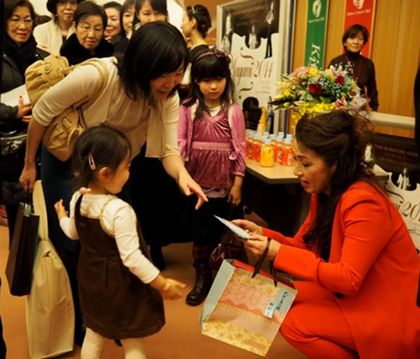
Charity Marathon "Paracup Sendai 2014"at Sendai Airport
PARACUP, Inc. (in Japanese)
organizes charity marathons to provide support to children of the world.
The first charity marathon was held in 2011 in the Tokyo Metropolitan Area.
Every year since 2012, the charity marathon has been held in the tsunami devastated area near Sendai Airport.
(cf. PARACUP Sendai (in Japanese).)
In 2014, it was held on Sunday, October 26 from 10:00 till 15:00. The many including those from
Kansai Area took part in the marathon. About 150 volunteers helped the organization.
The funds raised at the marathon will be used to support
children in the tsunami devastated areas.
(In collaboration with
KC of Sendai, Children's Fund)
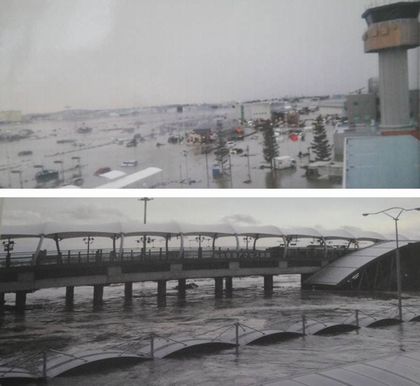
Sendai Airport was hit by the tsunami on March 11, 2011. (photos displayed at the Airport lobby.)
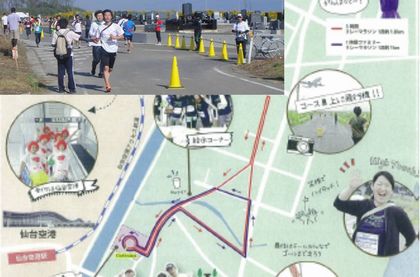
The area between Sendai Airport and the Pacific Ocean was devastated by the tsunami.
Those who used to live in the area continue to live in temporary houses, and are expected to be collectively
relocated to an inland area of Natori City.
The marathon course area will eventually be landfilled and regraded for roads and parks.
The marathon is intended for the participants and volunteers to get to know the current state of reconstruction
and to cheer up the people devastated by the tsunami.
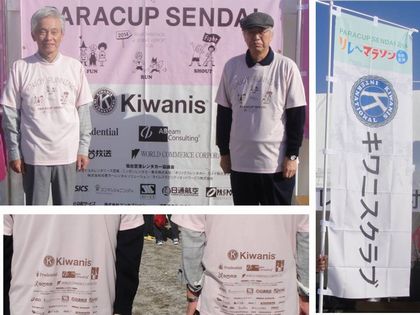
In response to the Kiwanis support, shirts for volunteers and the course marking flags had the Kiwanis logo.
(Hiroo Sato, Immediate Past President of the KC of Sendai to the left, and Kiwanis Joint Fund Steering Committee Chair
Yoshiaki Sato to the right.)
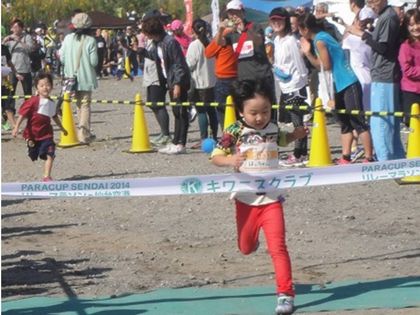
The goal tape also had the Kiwanis logo.
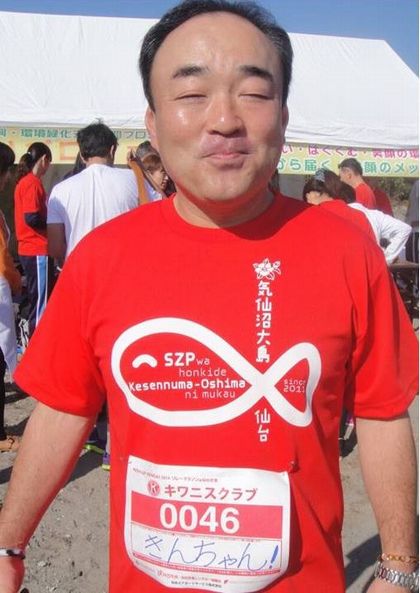
All the runners wore bibs with the Kiwanis logo (Miura, member, KC of Sendai)
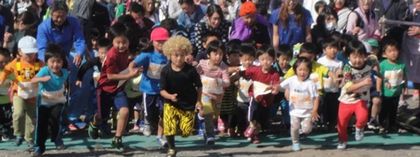
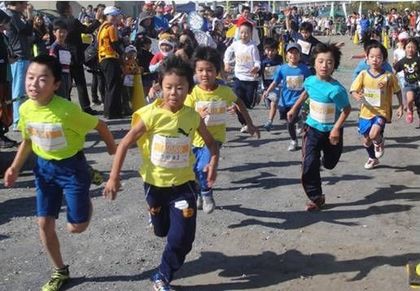
The "Kids run" for 100 children third graders or younger.
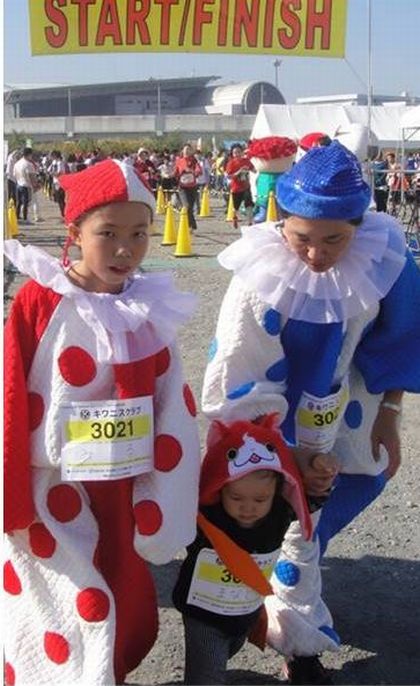
Many runners including those for the family marathon masqueraded.
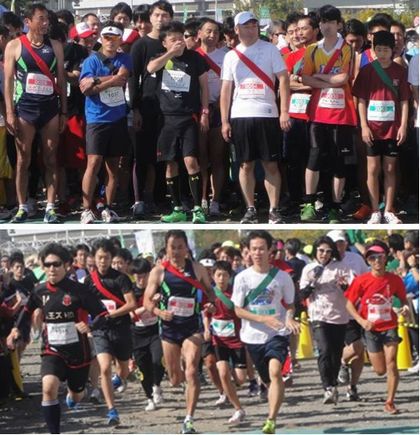
230 teams of about 1,300 runners took part in the 3 hour relay marathon.
The winning team ran 28 times around the 1.8 Km course (amounting to over 50 Km).
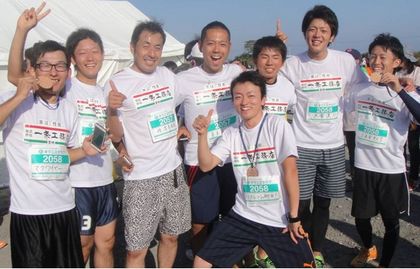
The team of Minegishi (Past President, KC of Sendai)
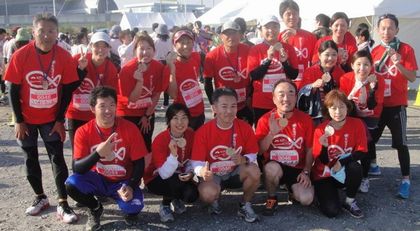
The team of Miura (member, KC of Sendai)
Children of Soma City, Fukushima Prefecture enjoyed fellowship with children of Kami Tomita Town,
Wakayama Prefecture
For the second time, Kami Tomita Town, Wakayama Prefecture invited 25 children of Fukushima Prefecture.
This year, children of Soma City, Fukushima Prefecture enjoyed fellowship with children of Kami Tomita Town
through home-stay and outdoor activities. (From August 1 till August 9, 2014)
This fund supported a part of the expenditure.
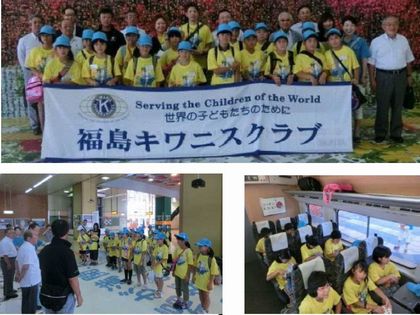
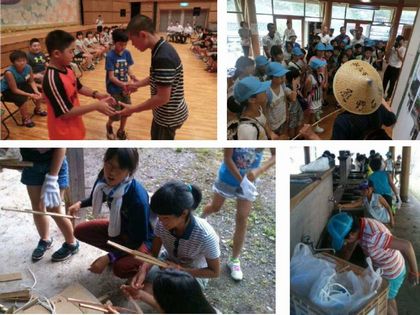
Children of Fukushima invited to Japan Sea side in Shibata City, Niigata Prefecture
For the fourth time, Shibata City in Niigata Prefecture provided 50 children of Fukushima
with the opportunity to enjoy swimming and outdoor activities on the Japan Sea side.
(From July 30 till August 1, 2014)
This Fund supported the
bus charter and accommodation fees.
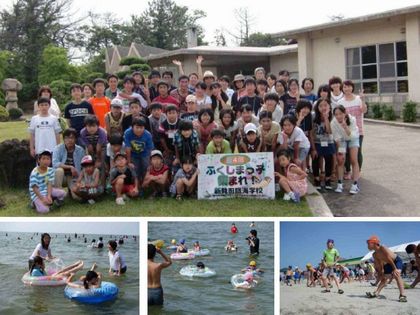
Electronic blackboard for Watari Junior High School, Watari Town, Miyagi Prefecture
The school is making full use of the electronic blackboard. One additional electronic blackboard is
indispensable.
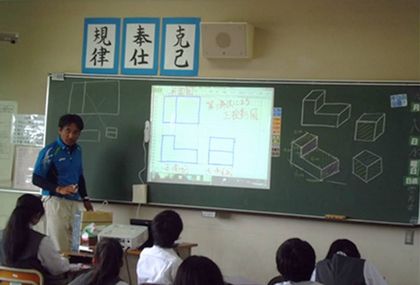
Educational equipment for Takaya Elementary School, Watari Town, Miyagi Prefecture
The school needs to purchase educational equipment lost by the earthquake and tsunami on March 11, 2011.
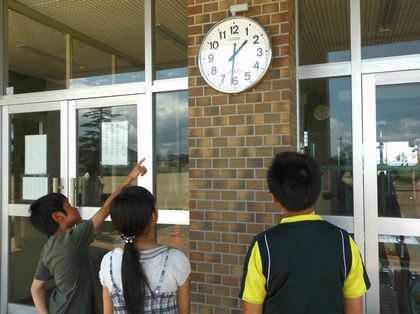
TV set for Yoshida Elementary School, Watari Town, Miyagi Prefecture
Two existing TV sets turned out to be insufficient for information when the school was used for temporary shelter.
They will be used for audio-visual education.
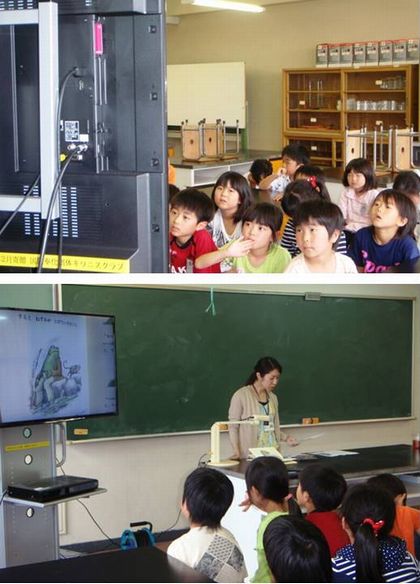
Life jackets for Arahama Elementary School, Watari Town, Miyagi Prefecture
The school buildings were completely destroyed by the tsunami on March 11, 2011.
The classes were re-started at the new buildings in April 2014. Life jackets and training for their use are
indispensable.
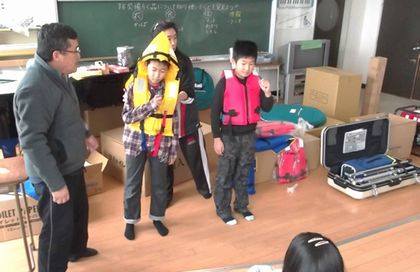
Swimming pool benches for Ookuma Elementary School, Watari Town, Miyagi Prefecture
The school buildings were devastated by the tsunami on March 11, 2011. The swimming pool under reconstruction
is expected to be available in summer 2014.
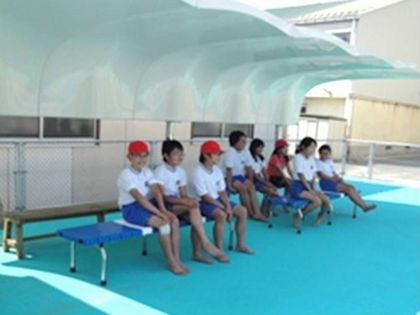
Educational equipment for Nagatoro Elementary School, Watari Town, Miyagi Prefecture
The school buildings were completely destroyed by the tsunami on March 11, 2011. The school is temporarily
using a building of Yoshida Junior High School. It needs educational equipment lost by the tsunami.
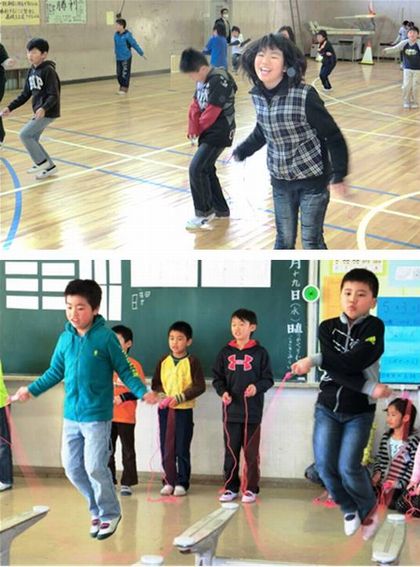
Educational equipment for Arahama Junior High School, Watari Town, Miyagi Prefecure
The school buildings were completely destroyed by the tsunami on March 11, 2011. The school is temporarily
using the third floor of Ookuma Junior High School. In September 2014, the school expects to start using
the new building currently under construction. It needs educational equipment lost by the tsunami.
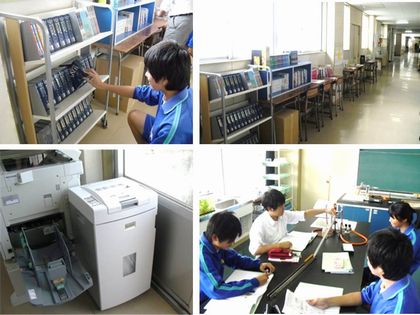
Picture books and Kiwanis dolls for Takeda General Hospital in Aizu Wakamatsu City, Fukushima Prefecture
Many from coastal areas of Fukushima Prefecture continue to live in temporary houses in Aizu Wakamatsu City.
Takeda General Hospital in the City takes care of many children living in the temporary houses.
Kiwanis dolles and Picture books were donated to the hospital.
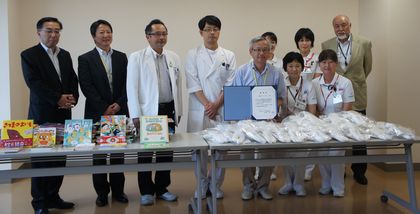
Tricycles for temporary Tomioka Kindergarten in Fukushima Prefecture
People of Tomioka Town in Fukushima Prefecture live in temporary houses in two separate communities:
one in Miharu Town and the other in Kooriyama City both in Fukushima Prefecture.
To its temporary kindergarten in Miharu Town, KC of Fukushima earlier donated Kiwanis dolls and picture-story shows.
This time, 8 tricycles were donated.
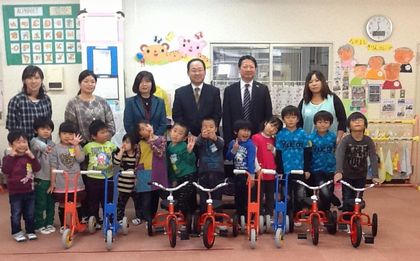
Children invited to Mayumi Concert in Sapporo
Mayumi OHIRA, concert master of Sapporo Philharmonic Orchestra produces Mayumi Concerts three times a year.
30 children each time (90 children in total) from Fukushima living in Sapporo will be invited to the
concert.
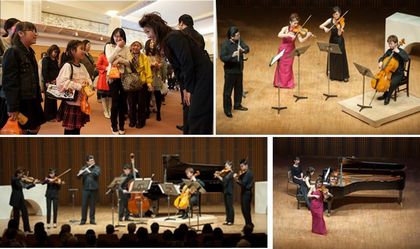
Reading and Music Recital for children and their parents
in Koriyama City, Fukushima Prefecture by
"Present from Starly Man", Inc.
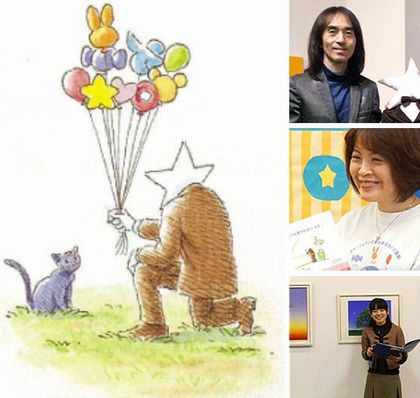
Present from Starly Man, Inc.
(in Japanese) is run by Hasegawa Family.
Father draws pictures, mother writes stories for them, and the daughter then plays the role
of the producer and takes care of reciting. They have been carrying out their activities
especially for children devastated by the Great East Japan Earthquake and Tsunami,
very often in collaboration with the Kiwanis Club of Fukushima.
"Starly Man" is the main character in the stories
and is supposed to present nine balloons that make people's dream come true.
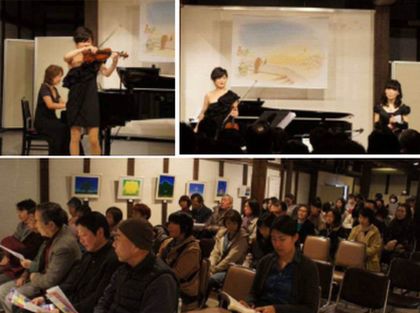
140 children and parents took part in the Reading and Music Recital held in Koriyama City,
Fukushima Prefecture.
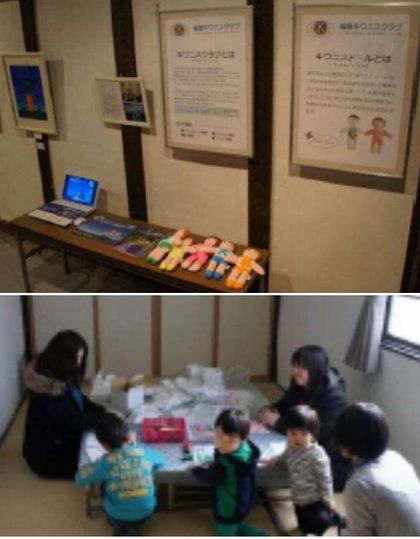
The display by the Kiwanis Club of Fukushima. The drawing session of Kiwanis dolls was
very popular for children.
Fukushima children and their parents who are seeking refuge in Sapporo City
invited to an event during the 2014 Sapporo Snow Festival
300 among about 1,000 children and parents from Fukushima who are seeking refuge in
Sapporo City were invited to a lively "Yosakoi Soran" dance performance
during the 2014 Sapporo Snow Festival.
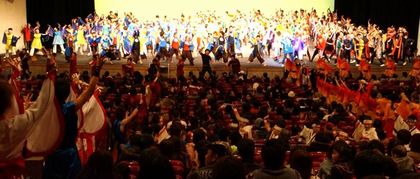
Lively "Yosakoi Soran" dance.
Children invited to Violin Concert in Sapporo
Kiwanis Club of Sapporo invited 100 children and their parents
who temporarily live in Sapporo City after the Great East Japan Earthquake
as well as 11 pupils of Akazaki Junior High School in Ofunato City, Iwate Prefecture,
to the 20th Anniversary Gala Concert (at Sapporo Concert Hall on January 7, 2014)
of "Mayumi Concert series" organized by Mayumi OHIRA, concert master and violinist
of Sapporo Symphony Orchestra.
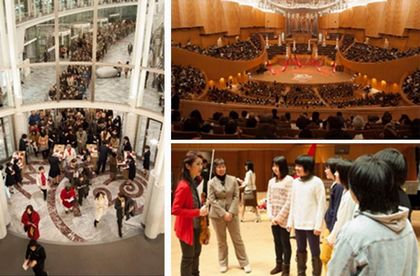
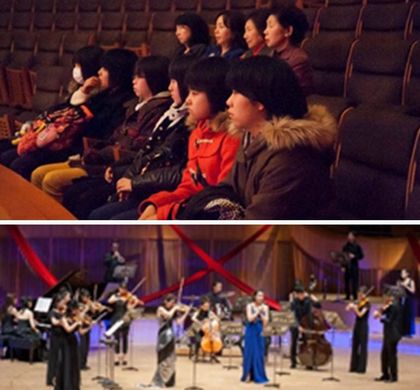
Koizumi Junior High School students came to visit the Kiwanis Club of Sendai
On November 6, 2013, seven second year students ("eighth graders") and their
teacher of Koizumi Junior High School (in Kesennuma City, Miyagi Prefecture)
came to visit the office of the Kiwanis Club of Sendai
to express their gratitude for the financial assistance to the school's extracurricular
educational activities by the Kiwanis Club Joint Fund
in collaboration with the
Heart on Coin "Kizuna" project
(by students of Kwansei Gakuin University)
and
Kiwanis Clubs of Sendai, Children's Fund.
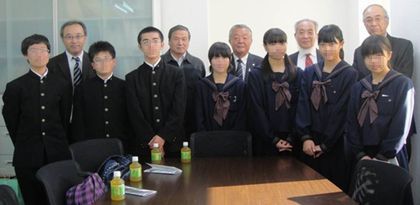
Group photo taken at the office of the KC of Sendai.
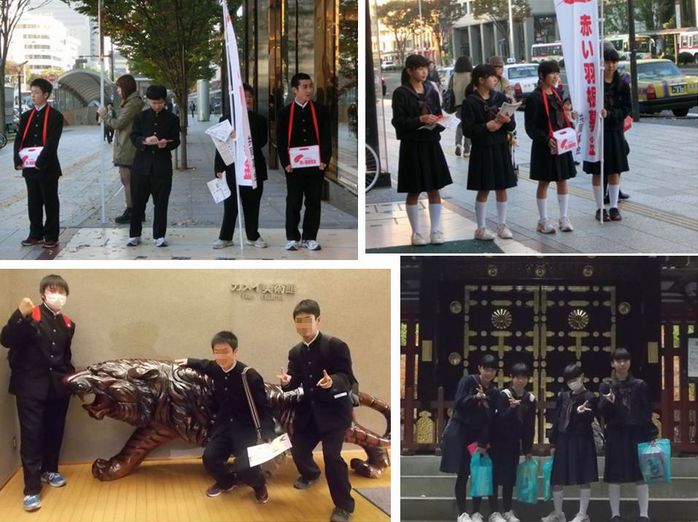
As in every year, the second year students (17 of them this year) made an overnight trip
to Sendai City. As a volunteer activity, they solicited funds in downtown Sendai for the
annual nationwide charity. They then split into groups to visit and write report on
historical buildings, museums, etc. as a preliminary practice for what they will do next year
during their graduation trip to Tokyo.
Activities Report 4
Support for children of Soma City, Fukushima Prefecture
The travel expenses for 25 elementary school children in Soma City, Fukushima Prefecture
to play in the sea, mountain and river of Kami Tomita Town, Wakayama Prefecuture in
Western Japan. The children have been suffering from the devastation caused by the
Great East Japan Earthquake on March 11, 2011, and enjoyed the nature together with
town people from July 27 till August 3, 2013. Members of the KC of Wakayama also took part.
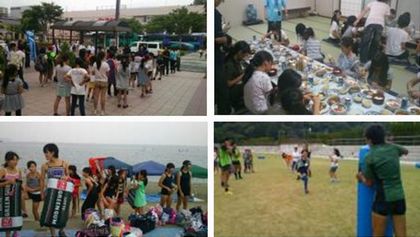
Departure, dinner in Wakayama, sea bathing, and rugby with high-school pupils
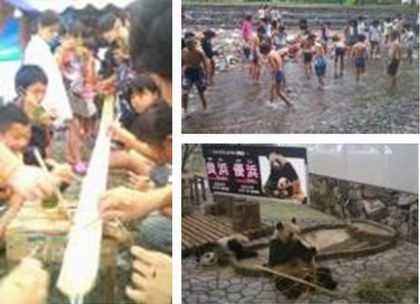
Camp, fish catching, and panda
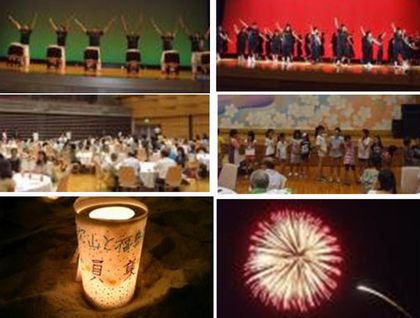
Farewell dinner, candle service and fireworks
Present for children at four child-care centers in Shinchi Town, Soma County,
Fukushima Prefecture
Picture-story show materials presented to 4 child-care centers in Shinchi Town, Soma County,
Fukushima Prefecture together with Kiwanis dolls and copies of the booklet providing mothers
and children with easily understandable correct information on radioactivity caused by the
tsunami at the Fukushima Daiichi Nuclear Power Plant.
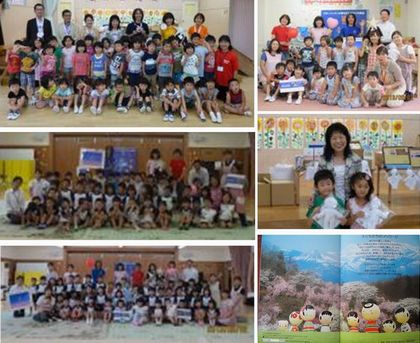
Financial assistance to Yuriage Elementary School in Natori City, Miyagi Prefecture
for its celebration of the 140th Anniversary
Yuriage Elementary School was devastated by the tsunami on March 11, 2011
and continues to carry out its educational activities at a temporary school building
elsewhere in the city.
To celebrate its 140th Anniversary, the school produced and distributed 300 plastic clear folders
on which are printed the school song and the photo of the school symbol "Chibikko Maru"
(the boat named "tot") on the old school ground.
The current first and second graders of the school have never had chance to play at
the symbol.
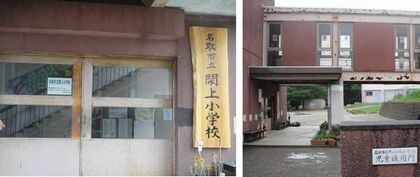
The temporary school building of Yuriage Elementary School inside Fujigaoka Elementary
School in the city.
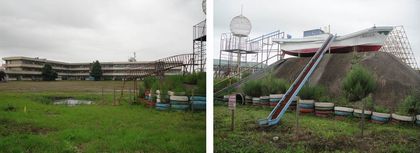
The old tsunami-devastated school building and "Chibikko Maru" on the school ground
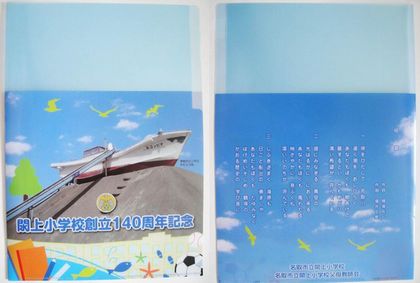
Clear folder to commemorate the 140th Anniversary.
Financial support to Koizumi Junior High School in Kesennuma City, Miyagi Prefecture
for extracurricular educational activities.
(In collaboration with the
Heart on Coin "Kizuna" project
by students of Kwansei Gakuin University
and
Kiwanis Club of Sendai, Children's Fund.)
Kesennuma City was devastated by the tsunami on March 11, 2011. Many pupils of
Koizumi Junior High School continue to live in temporary houses. To alleviate the financial
burden on the parents for extracurricular educational activities, we provide the
necessary financial support.
The school will be unified with another junior high school in April, 2016.
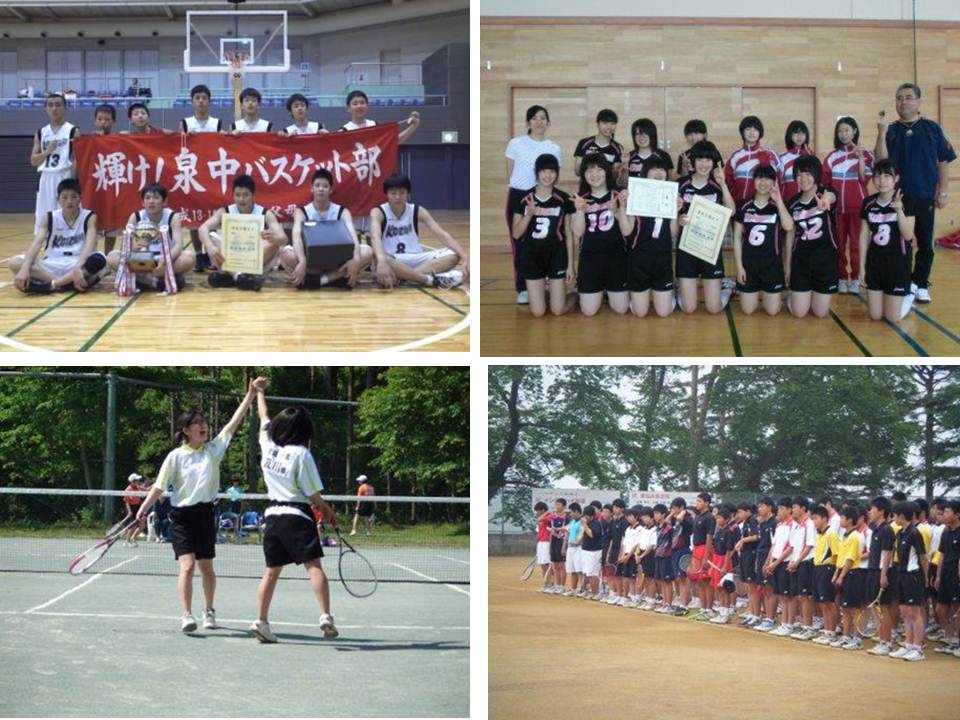
On June 8 and 9, 2013 all 49 pupils of Koizumi Junior High School took part in the
Athletic Meet of the Kesennuma-Motoyoshi District.
Boy's basketball team came in first, Girl's Volleyball team came in third, and
Girl's soft-ball tennis team came in third.
Support for Social Welfare Corporation "Minori-kai" in Natori City, Miyagi Prefecture
Publication and distribution of a booklet on radioactivity
The booklet provides parents and children with easily understandable correct information on
radioactivity caused by the tsunami damage at the Fukushima Daiichi Nuclear Plant.
Traditional wooden "Kokeshi" dolls play the role of children.
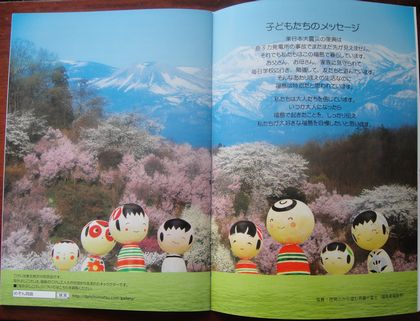
Pamphlet Excerpt (in Japanese)
TERACO Kiwanis building video report
The Kiwanis building is fully functioning as the library.
TERACO library video
This video was created by a high school student user of TERACO.
Study Space TERACO (Shizugawa, Minami Sanriku Town, Miyagi Prefecture)
"Kiwanis Library Building" donated by Kiwanis Clubs Joint Fund, "Bikki Music Building"
donated by the Bikki Organization Miyagi, and "TERACO Study Building" donated by another
organization. Children and local volunteers finished the interior using materials
purchased through the support of KC of Sendai, Children's Fund. The electric work
for the Kiwanis and Bikki Buildings were supported by the KC of Sendai, Children's Fund
and the Bikki Organization Miyagi, respectively.
The three buildings are in full operation for many children who live in
temporary houses. At our visit around noon on December 8, 2012
we could meet only a few children, since most of the children come to TERACO
in late afternoons and evenings.
See our earlier reports in "Activities Report 3" for the history of TERACO and our support.
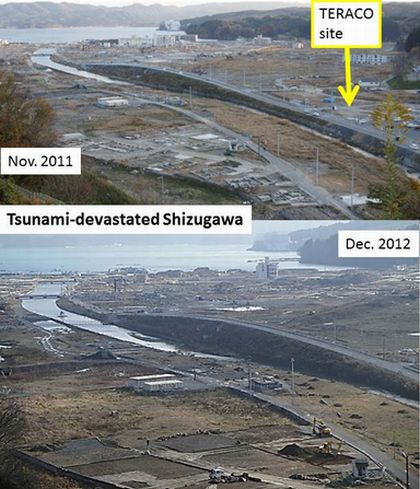
Many of the tsunami-devasted buildings and rubble in Shizugawa have been cleared.
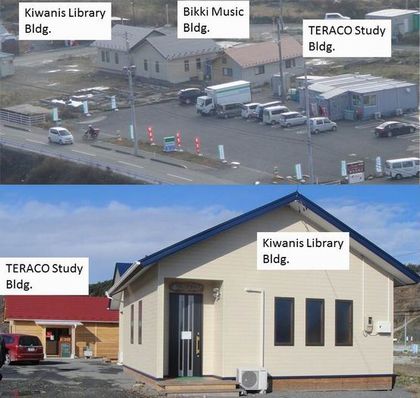
View of the three buildings.
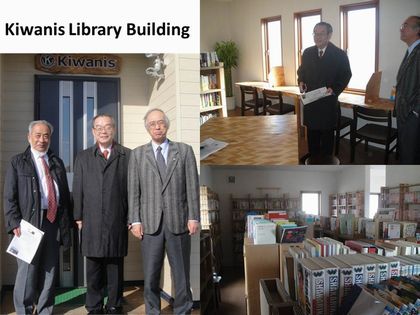
Kiwanis Library Building.
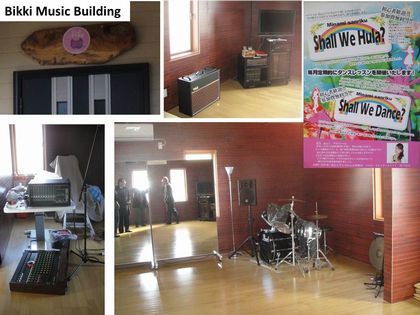
Bikki Music Building. It is also used for dance lessens for adults.
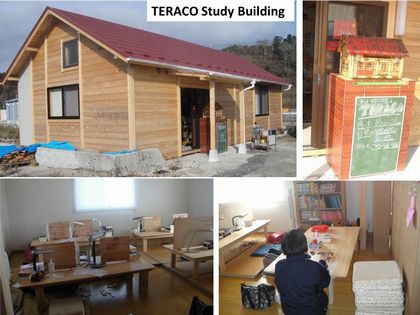
TERACO Study Building.
Support for the "Cosmos Festival" of Namie Junior High School
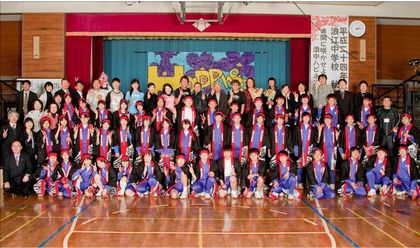
Support for the "Cosmos Festival" on October 28, 2012 by pupils of Namie Junior High School,
which was closed due to its proximity to Fukushima Daiichi Nuclear Plant and was reopened
in August, 2011 with only 49 students (those wearing "happi" coat) at an old elementary school
building in Nihonmatsu City, Fukushima Prefecture.
(In collaboration with the Bikki Organization Miyagi and Kiwanis Clubs Sendai Children's Fund)
Traveling expense support for two high school students to visit Cambodia
Kiwanis Clubs Joint Fund provided traveling expenses for two high school students
from the areas stricken by the Great East Japan Earthquake to take part in the
Cambodia Study Tour with Photo Journalist Ms. Natsuki YASUDA.
Ms. Yasuda herself in her high school days went to Cambodia as a “Reporter for Friendship”
of the Non-profit organization “Children without Borders”.
One of the students was a 15 year old girl from Ozuchi Cho, Iwate Prefecture.
She and her family could barely escape the tsunami. She started taking photographic records
of the tsunami devastation since then, especially on the 11th every month.
The other was a 16 year old girl from Shibata Gun, Miyagi Prefecture. The earthquake struck
her area immediately after the commencement of her junior high school.
She joined the photograph club of her high school and has been working with the club members
to support the reconstruction of the earthquake stricken areas.
The Tour first visited in Phnon Penh the “Killing Fields” of the scene of the massacre
during the Pol Pot regime (1975--79), and then Toul Sleng Genocide Museum where they listened
to the horrifying stories from a man who survived the torture.
Then, among others, they visited the following activities of Japanese non-profit organizations,
and could meet many friendly children:
- Mobile Library run by the Shanti (meaning “peace”) Volunteer Association in slums.
- Listened to the story by Mr. Ryoji TAKAYAMA of the “International Mine Clearance and
Community Development”, and observed mine clearance activities.
- The factory run by non-profit organization “Kamonohashi Project” against child
trafficking.
They had a chance also to visit Angkor Wat and Angkor Thom.
The girls learned a lot from their first trip abroad. They would like to work harder for the
reconstruction of their communities and go back to Cambodia after they get more experienced.
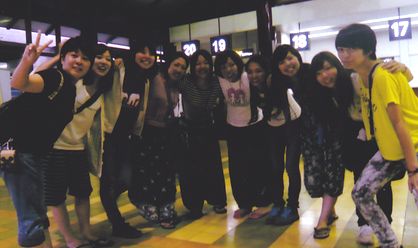
Cambodia Study Tour members
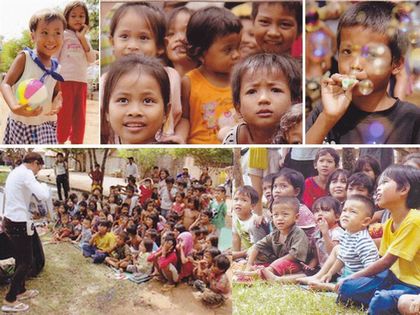
Children they met in Cambodia
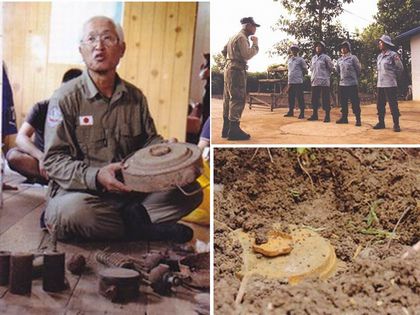
Mr. Ryoji TAKAGI of International Mine Clearance and Community Development
Activities Report 3
Indoor play equipment for the day-care center run by Social Welfare Corporation
Asaka Aiiku En for handicapped children.
Its building was destroyed by the earthquake and reconstructed.
The handicapped children need the play equipment to play indoors at the reconstructed building
without fear of radioactivity.
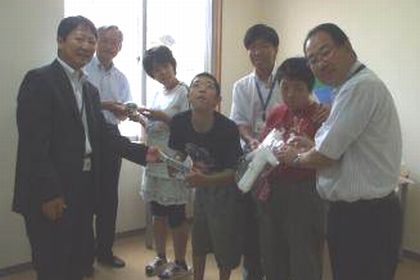
Presentation (20 September, 2012)
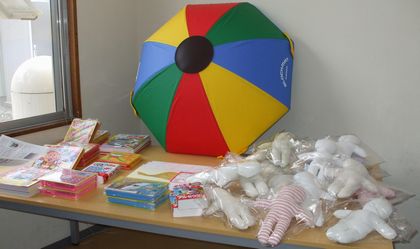
Picture books, wooden blocks and 100 Kiwanis Dolls (made by Kiwanians in the US).
Educational materials for Namie Junior High School, Fukushima Prefecture reopened in
Nihonmatsu City, Fukushima Prefecture in August, 2011
Namie Junior High School was closed due to its proximity to Fukushima Daiichi Nuclear Plant
and was reopened in August, 2011 with only 49 students at an old elementary school building
in Nihonmatsu City, Fukushima Prefecture. Educational materials were donated.
(Jointly with the Bikki Organization Miyagi)
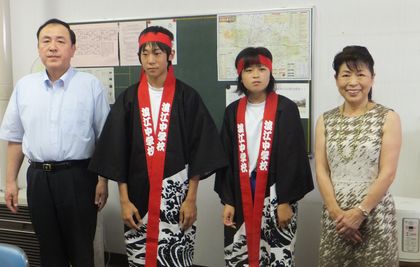
Presentation (28 August, 2012. President Ayako WAGO of KC of Fukushima on the extreme right.)
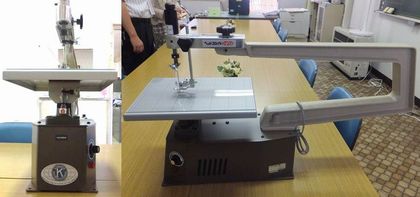
Three electric jig saws among the educational materials
Wooden play equipment for the children at Fukushima Bunka Segami Kindergarten
in Fukushima City
The children can play indoors without fear of radiation.
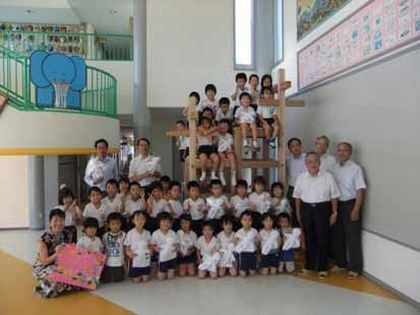
Wooden jungle gym (27 August, 2012)
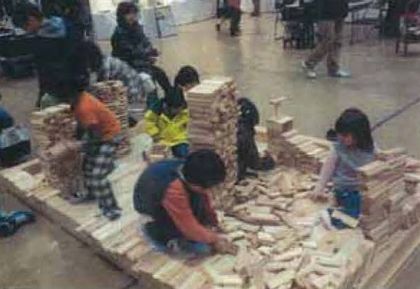
Wooden blocks
Pay-back-free scholarship for 40 children orphaned by the tsunami disaster in Ishinomaki City,
Miyagi Prefecture.
Pay-back-free scholarship through Ishinomaki City Board of Education for 40 children
orphaned by the tsunami disaster. The monthly scholarship will be 10,000 Yen, 20,000 Yen
and 30,000 Yen, respectively, for elementary school children, unior high school students,
and senior high school students.
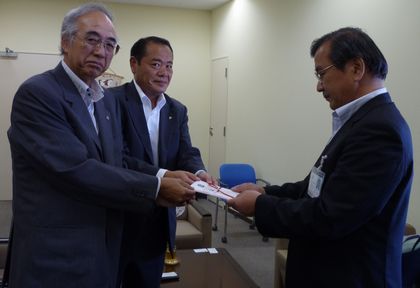
Scholarship fund to Mr. Naohiko Sakai, Ishinomaki City Superintendent of Education
(3 September, 2012)
TERACO Kiwanis Building: Electric work completed (5 September, 2012)
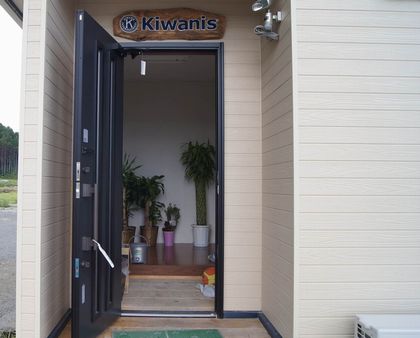
The entrance to the TERACO Kiwanis Building
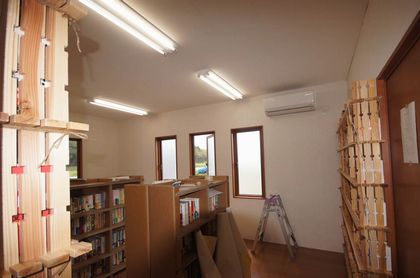
Electric work on September 5, 2012 following the completion of the interior
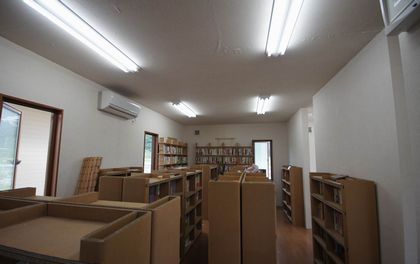
Two of the air conditioners donated by COSTCO Wholesale Japan, Inc. installed
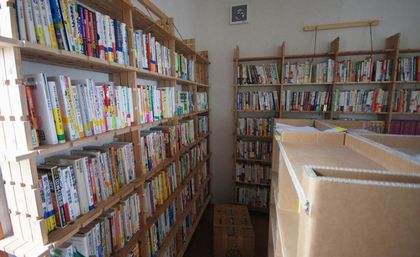
10,000 new books from BOOKOFF Corporation (donated by GDR, Inc.) installed
Student volunteers work on the interior of the "Kiwanis Building"
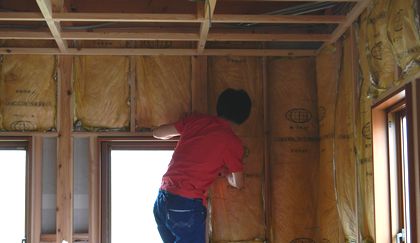
Heat-insulating glass wool installation
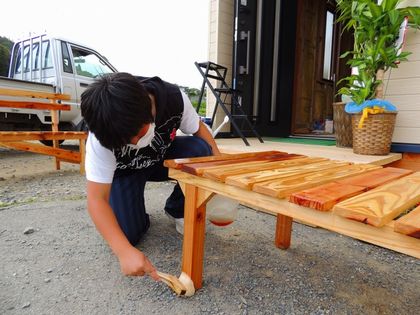
Furniture painting
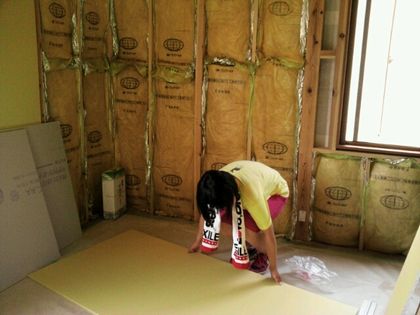
Plasterboard cutting
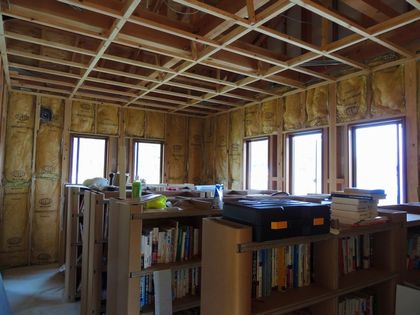
July 2012
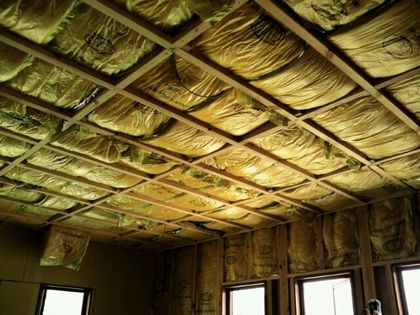
July 2012
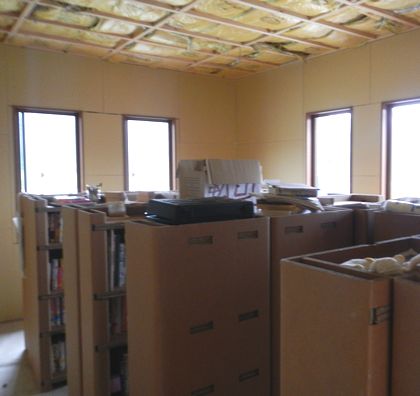
July 2012
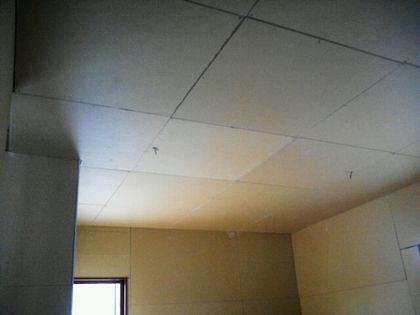
Interior finished on August 5, 2012
Temporary "Kiwanis Building" donated to Study Space TERACO
in Shizugawa, Minami Sanriku Cho, Miyagi Prefecture
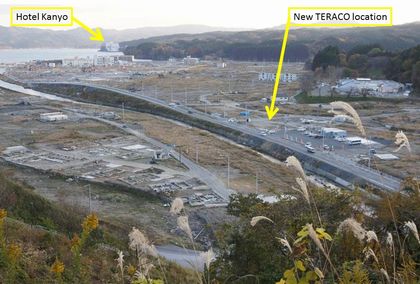
Shizugawa viewed from Shizugawa Junior High School (November, 2011)
Shizugawa, Minami Sanriku Cho was devastated by the tsunami on March 11, 2011.
On April 20, 2011, Ms. Ayumi OGUSU, a volunteer from Tokyo, started
Study Space TERACO inside the temporary shelter at the Shizugawa Elementary School
Gymnasium with the cooperation of college students from Tokyo and Sendai.
TERACO was continued there until May 6, 2011.
TERACO was resumed on June 17, 2011 inside Minami Sanriku Hotel Kanyo
courtesy of the hotel.
At TERACO volunteer college and university students help children's study without charge
like big brothers and sisters. No reservation is required. TERACO is open every day
throughout the year. More than 150 children are registered, totalling over 6,000 so far.
Kiwanis Club of Sendai, Children's Fund has been supporting TERACO since November, 2011.
Children's life is almost back to normal. Schools run on regular schedule.
Town bus and school bus take them to the schools and back from temporary houses and
houses on high grounds. However, there are no space for the children to engage in hobbies
and get together with friends.
Kiwanis Clubs Joint Fund came to know about the TERACO children's dream "Railtrack to the future",
and decided to donate temporary "Kiwanis building" as TERACO library.
Fortunately,
The Bikki Organization Miyagi
(Mr. Muneyuki Sato, Representative Director), which has been in disaster relief collaboration
with Kiwanis Club of Sendai, Children's Fund, decided to donate temporary "Bikki building"
as TERACO music studio.
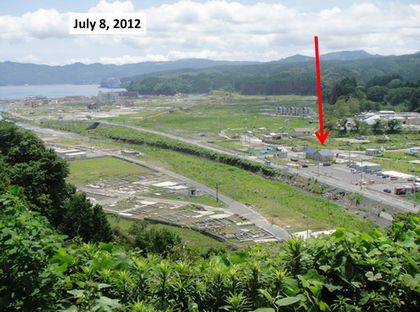
Sato Komuten, Inc. in Minami Sanriku Cho provided for the buildings an ideal location,
which is almost in equal distance from Shizugawa Elementary School, Shizugawa Junior High School
and Shizugawa High School. Ichijo Komuten Miyagi, Inc. sacrificed weekends and holidays
to complete the buildings before the children's summer recess.
The first step to realize the children's dream.
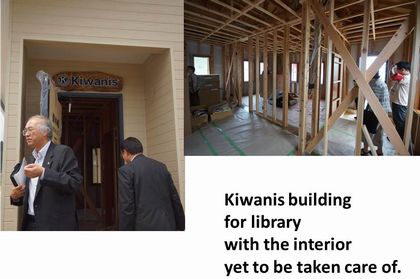
"Kiwanis building" as TERACO library.
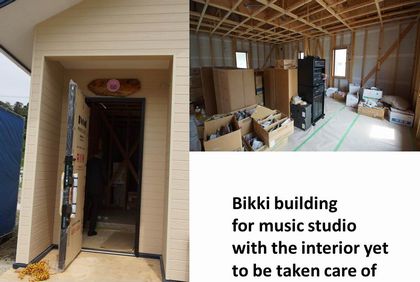
"Bikki building" as TERACO music studio.
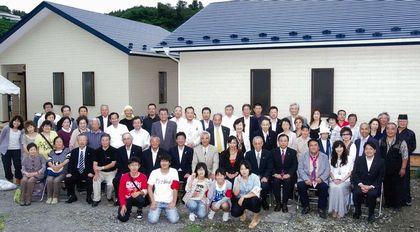
The inauguration of the two buildings was held on July 14, 2012.
Kiwanis Club of Sendai and
its Children's Fund
are planning further support to TERACO.
Here are more details on TERACO's accomplishments:
Study space TERACO (its history and accomplishments up to July 14, 2012)
Activities Report 2
Support of a junior high school and two elementary schools
through the Miyako City Board of Education in Iwate Prefecture
Tsunami caused heavy damage to Taro Daiichi Junior High School, Uiso Elementary School
and Chikei Elementary School in Miyako City, Iwate Prefecture.
Taro Daiichi Junior High School can use only the second and third floors for classes, because
the heavily damaged first floor is under reconstruction.
Uiso Elementary School and Chikei Elementary School cannot give classes in their school buildings,
and use temporary classrooms located at Omoe Elementary School.
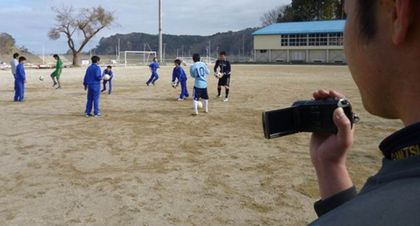
Kiwanis supported Taro Daiichi Junior High School to purchase a digital video camera
to record the pupils' activities.
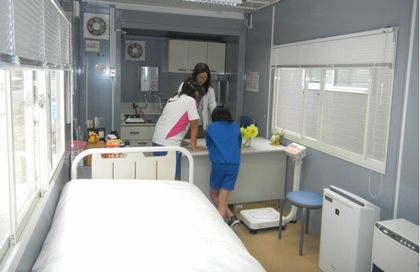
A manufacturer provided the Elementary Schools with a prefabricated building that can be
used as temporary School Nurse's Office.
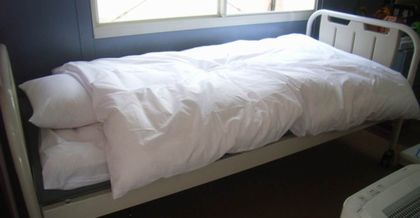
Kiwanis supported the elementary schools to purchase a bed and mattress for the Nurse's Office.
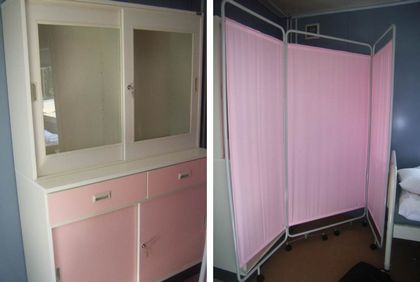
Kiwanis supported the elementary schools to purchase a medicine cabinet and a partition.
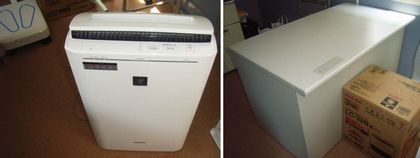
Kiwanis supported the elementary schools to purchase an air purifier and a desk.
Ofunato Elementary School in Ofunato City, Iwate Prefecture
The tsunami flooded the school building above the first floor level.
The euipment, furniture and curtain were soaked in seawater and became unusable.
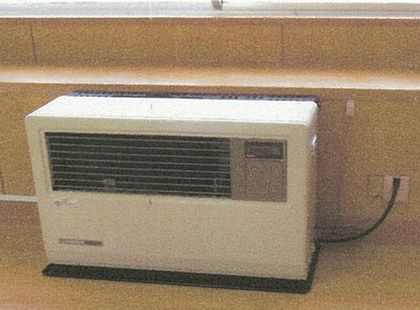
Kiwanis (KC of Sendai, Children's Fund and Kiwanis Clubs Joint Fund) supported the school
to purchase new kerosene heaters.
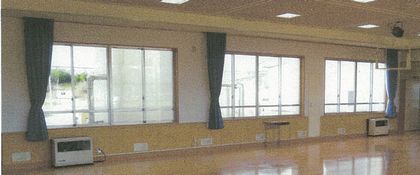
Kiwanis (KC of Sendai, Children's Fund and Kiwanis Clubs Joint Fund) supported the school
to have new flameproof curtain to be installed.
Sendai City Softball Association
The tsunami took away the equipment it owned to organize softball games.
Gamou Softball Park was devastated by the tsunami as well. Nets for outfield fence and
other equipment are needed for softball games at substitute junior high school grounds.
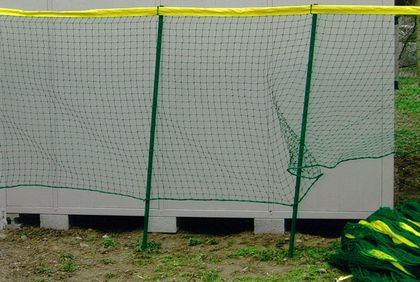
Net for outfield fence purchased through the Kiwanis support.
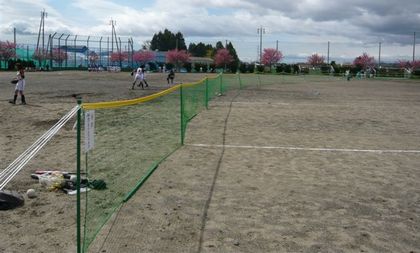
Net for outfield fence in action.
Miyagi Prefectural Ishinomaki Special Needs School
The tsunami did not reach the school, but the buildings suffered damages.
The school needs a TV, projectors and amplifiers for the thirtieth anniversary events,
but cannot expect grants from Miyagi Prefecture.
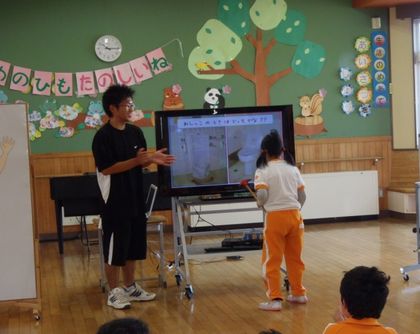
Class using the TV set purchased through the Kiwanis support.
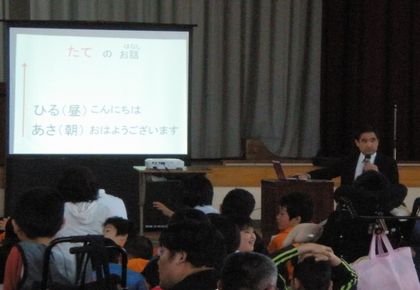
Principal giving speech at the school meeting using the projector purchased
through the Kiwanis support.
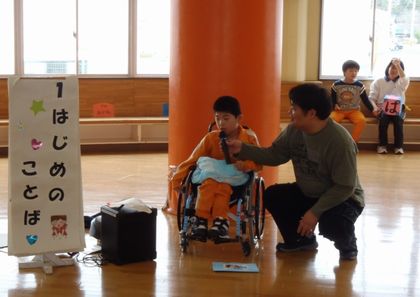
A meeting of the Elementary School Section of the school using the portable
amplifier purchased through the Kiwanis support.
Caps and traditional school backpacks for first graders in Fukushima
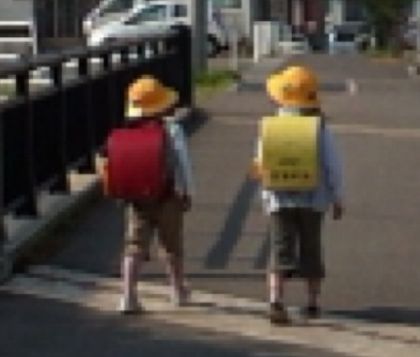
New first grade elementary school children in Fukushima commuting to and from their school
wearing the caps and traditional school backpacks presented to them by the KC of Fukushima.
KC of Sendai visited Higashi Matsushima City, Ishinomaki City and Onagawa Town,
Miyagi Prefecture (April 25, 2012)
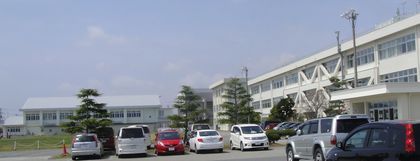
Higashi Matsushima High School in Miyagi Prefecture suffered damages from the earthquake,
but the tsunami stopped just short of the campus acrossed the street to the south.
The school building (to the right) was used as a temporary shelter for about 300 neighbors
for about a month until early April.
The school auditorium (to the left) served as a mortuary for 125 bodies.
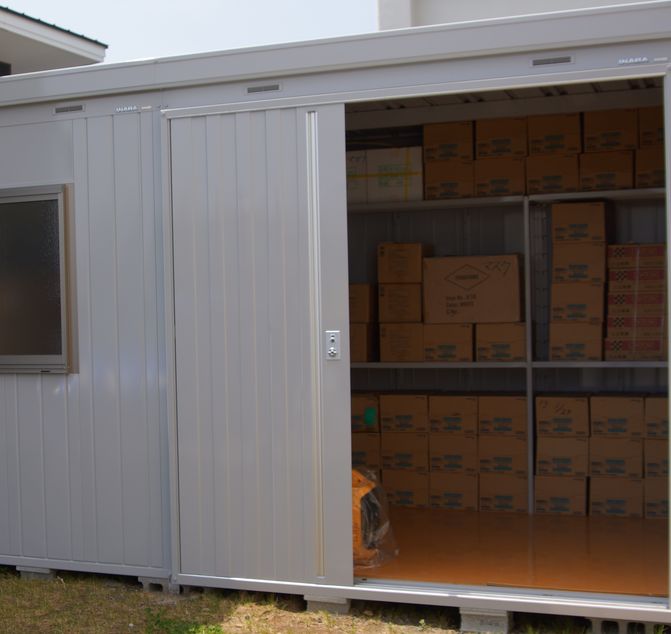
The prefabricated warehouse for emergency goods purchased by Higashi Matsushima High School
through our assistance in February.
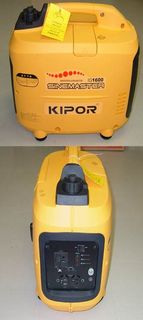
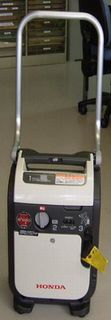
Two emergency power generators were also purchased by Higashi Matsushima High School
through our assistance in March and May.
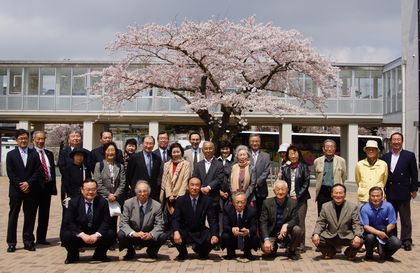
At Ishinomaki High School in Miyagi Prefecture.
Members of the KC of Sendai and Principal Kiyomi MIKUNI.
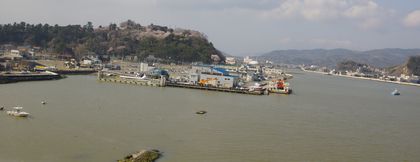
Hiyoriyama Hill viewed from Hiyori Bridge.
Ishinomaki High School is located on Hiyoriyama Hill (about 70 meters above the sea level),
and was in isolation for a few days without food surrounded by the area flooded by the tsunami.
The High School purchased official uniforms for its women's volley ball team through our
support jointly with KC of Sendai, Children's Fund.
The High School also purchased outboard engines for its rescue boat through our support.
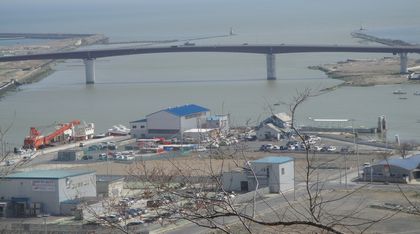
Hiyori Bridge over the mouth of Old Kitakami River viewed from Hiyoriyama Hill.
The tsunami came over the bridge.
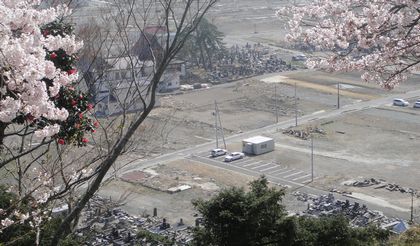
Ishinomaki City, Miyagi Prefecture viewed from Hiyoriyama Hill.
The rubble has been cleared, but...
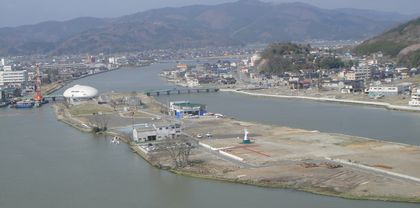
Nakase in Ishinomaki City viewed from Hiyoriyama Hill. The rubble has been cleared, but...
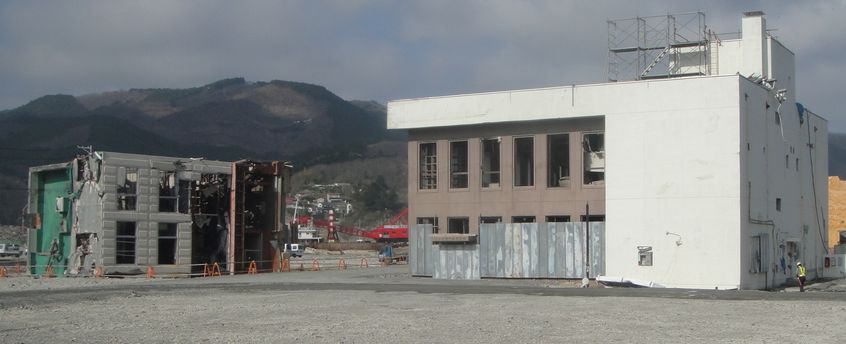
Onagawa Town, Miyagi Prefecture devastated by the tsunami.
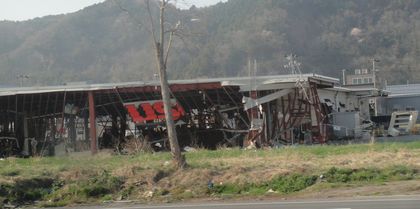
Many buildings were destroyed by the tsunami.
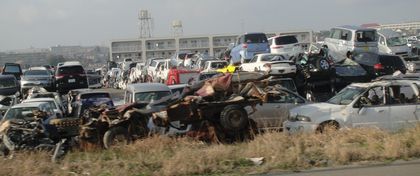
Many piles of cars damaged by the tsunami.
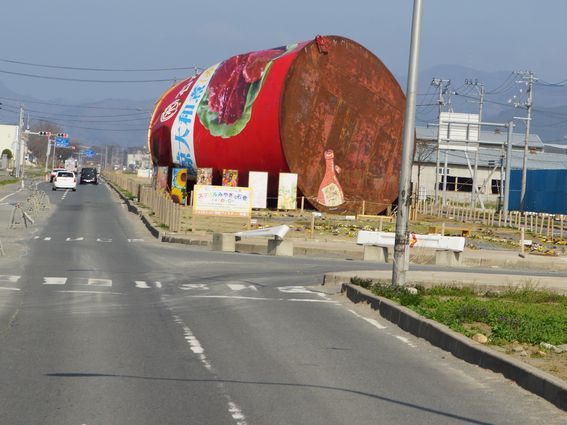
This oil tank of a can factory was carried 300 meters by the tsunami,
and reached the median strip of the highway.
Tsunami devastation in Rikuzen Takata City, Iwate Prefecture
The scenes encountered during our recent visit on March 29, 2012 to find out
possible further supports we could provide to the children in the City.
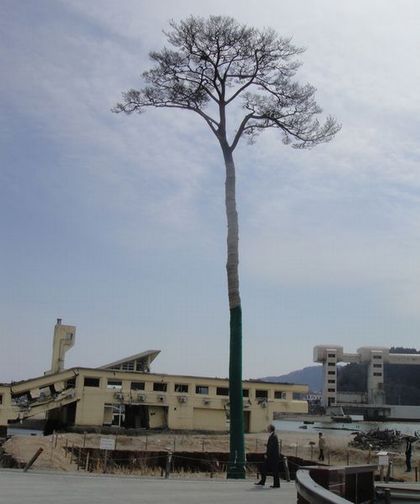
Only one pine tree out of about 70,000 in the beautiful pine forest along the shore
survived the tsunami devastation of March 11, 2011.
The building behind is the youth hostel.
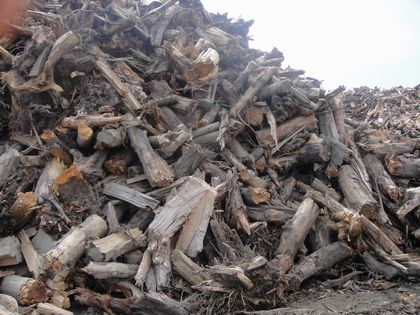
The rest of the pine trees form piles of debris yet to be treated.
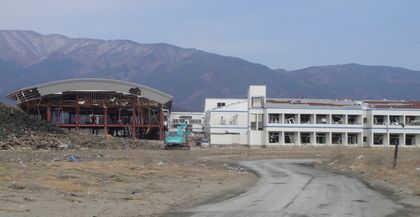
The outdoor activities center buildings near the pine forest.
Activities Report 1
Leaflets and paper cranes handed out
At the Kiwanis Asia-Pacific Convention (March 15--17, 2012 in Colombo City, Sri Lanka),
leaflets and paper cranes were handed out as tokens of appreciation for the disaster relief
contributions
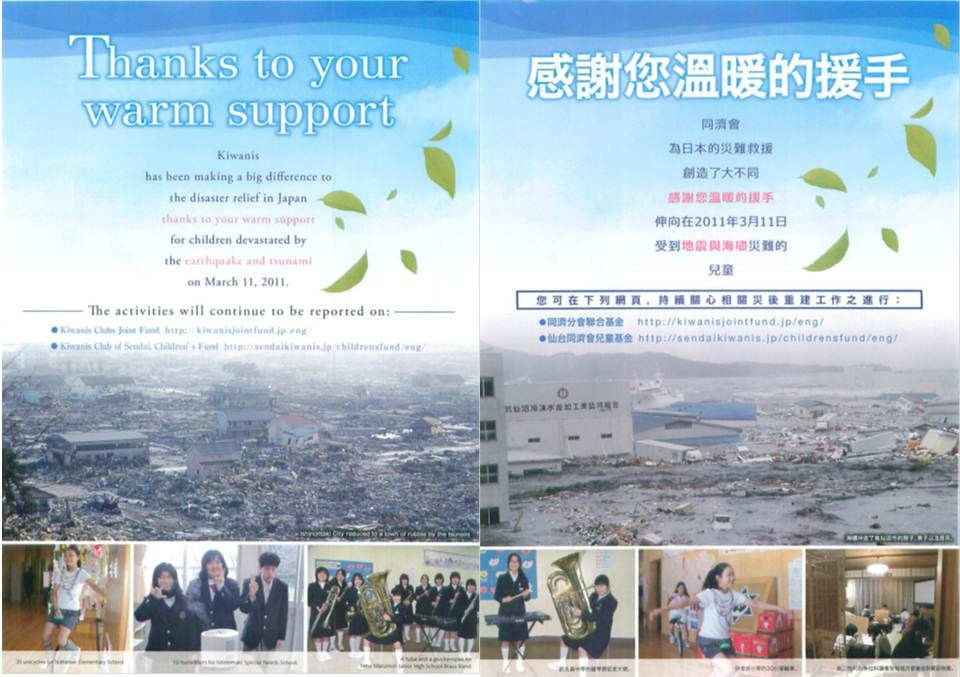
Leaflet printed in English and Chinese on both sides.

Paper cranes folded at the March 8th meeting of the KC of Sendai.
Storage metal racks for Arahama Elementary School in Sendai City, Miyagi Prefecture
The School was devastated by the tsunami, and is temporarily located on the
campus of Higashi Miyagino Elementary School in Sendai City.
The racks are indispensable to appropriate management of the relief goods from all over
the world.
A third grader among 91 pupils of Arahama Elementary School lost life.
The family members of 11 pupils died or are missing. 2 of them became orphans.
The tsunami reached 40 cm (16 inches) above the second floor of the school building.
320 including pupils and neighbors fled to the roof.
Their evacuation by helicopters started at about 5:00 pm and lasted until about
5:00 the following morning.

Arahama Elementary School neighborhood before and after the earthquake.

Arahama Elementary School yard and building before and after the earthquake.
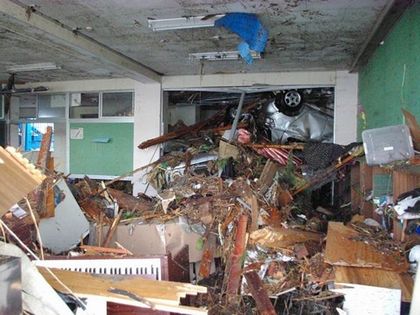
Tsunami-devastated classroom for the first graders at Arahama Elementary School.
A PC, an LC display, a laser printer, a bar-code reader and a shredder for
Ishinomaki Girls' High School, Miyagi Prefecture
The High School is located on Hiyoriyama hill side near the mouth of Kitakami River,
and was not hit by the tsunami. The earthquake, however, destroyed the PC, etc.
indispensable to the school library.
Picture story books for the Day-Care Center for Children run by Special Nonprofit
Corporation "Nobi Nobi Welfare Koriyama" in Koriyama City, Fukushima Prefecture
The Center takes care of 80 pre-school kids and 20 handicapped children, who have to
stay indoors to avoid radiation caused by Fukushima Nuclear Power Plants.
KC of Fukushima donated 61 picture story books and 30 Kiwanis dolls so that the children
have enough things to enjoy indoors.

Children surround Ayako WAGO (President, KC of Fukushima), Yoko YASUDA (Director of the Corporation),
etc. and sing a thank you song.

President Ayako WAGO and children.
A prefabricated warehouse for emergency goods emergency power generators
at Higashi Matsushima High School, Miyagi Prefecture
The High School is located in tsunami devastated Higashi Matsushima City, and needs
storage space for emergency goods as well as emergency power generators to run PC and TV
for communication and information.
Floor sheets for Ishinomaki Kobunkan High School gymnasium, Miyagi Prefecture
The tsunami flooded 40 cm (16 inches) above the floor level of the school, and
destroyed the floor sheets stored in the gymnasium. The floor sheets are indispensable
to the school ceremonies held at the gymnasium.
Refrigerator for lunch service to Hirota Day-Care Center for Children in
Rikuzentakata City, Iwate Prefecture.
The tsunami flooded the Center above floor level and destroyed the refrigerator
indispensable to lunch service.

Hirota Day-Care Center for Children and Director Keiko FUJIKURA on 28 February, 2012.

On 11 March, 2011, all the 104 children and all members of the staff escaped from the Center
(upper right) through the hill behind to the Hirota Junior High School
(upper left).

The refrigerator (front in the photo to the right) damaged by the tsunami was replaced by the new one
in the lunch service room (photo to the left).

Children enjoying snacks after a nap on 28 February, 2012.
School backpacks for new first graders
The Women's Club of Haranomachi Chamber of Commerce and Industry is to give
23 traditional school backpacks to new first graders. The Haranomachi Area
of Minami Soma City, Fukushima Prefecture is located at 20 km from Fukushima
Daiichi Nuclear Power Plant and has kids orphaned by the earthquake and tsunami.

Ms Miwako KURIHARA (Women's Club, Haranomachi Chamber of Commerce and Industry) and
President Ayako WAGO (KC of Fukushima)
School backpacks for elementary school kids
Okabe Children's Association is to give 15 traditional school backpacks to
elementary school kids in father-less families or those who live with their mothers to avoid the
radioactivity in the Okabe Area of Fukushima City.

Mr. Yoshihiro KATAHIRA (Okabe Children's Association) and
President Ayako WAGO (KC of Fukushima)
Instruments for the brass band of the new Marumori Junior High School
The Board of Education of Marumori Town, Miyagi Prefecture is to unify 4 junior high schools
into the new Marumori Junior High School. The Brass Band of the new school expects
more members and needs a tuba and a glockenspiel.
Jointly with
KC of Sendai, Children's Fund
and
the Bikki Organization Miyagi

The tuba and glockenspiel for the brass band of the current Marutate Junior High School
that is to become the new Marumori Junior High School.
An outboard engine for the rescue boat for Ishinomaki High School Boat Club
Three outboard engines for rescue boats of the Ishinomaki High School Boat Club
(in Ishinomaki City, Miyagi Prefecture) were damaged by the tsunami. The club has been
borrowing outboard engines indispensable to its activities.
Sand prevention rubber mats for 8 schools in Sendai City
Sand prevention rubber mats for the entrances to the temporary school buildings
of 8 schools in Sendai City (through the Sendai City Board of Education)
Jointly with
KC of Sendai, Children's Fund

Rubber mats at the entrances to the first floor classrooms of Nankodai Junior High School
in Sendai City
Classroom equipment for temporary school buildings in 3 elementary schools
and 3 junior high schools in Sendai City
Nakano Elementary School, Higashi Rokugo Elementary School, Arahama Elementary School,
Nanakita Junior High School, Nishiyama Junior High School and Atago Junior High School
had to give classes in their gymnasium with the makeshift classrooms separated by cardboard partition
until they could start using on 7 November the classrooms in the prefabricated school buildings.
Through the Sendai City Board of Education, the KC of Sendai donated classroom equipment
for the new classrooms that cannot be taken out from the old classrooms in the school buildings
too dangerous to enter.

Arahama Elementary School neighborhood before and after the earthquake.

Arahama Elementary School yard and building before and after the earthquake.
A third grader among 91 pupils of Arahama Elementary School lost life.
The family members of 11 pupils died or are missing. 2 of them became orphans.
The tsunami reached 40 cm (16 inches) above the second floor of the school building.
320 including pupils and neighbors fled to the roof.
Their evacuation by helicopters started at about 5:00 pm and lasted until about
5:00 the following morning.

Tsunami-devastated classroom for the first graders at Arahama Elementary School.
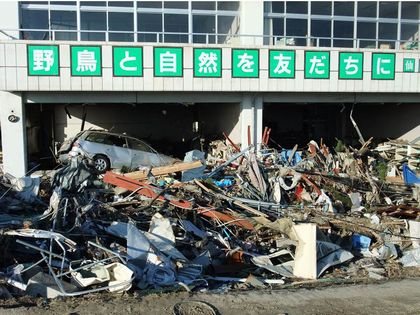
Nakano Elementary School three days after the earthquake.
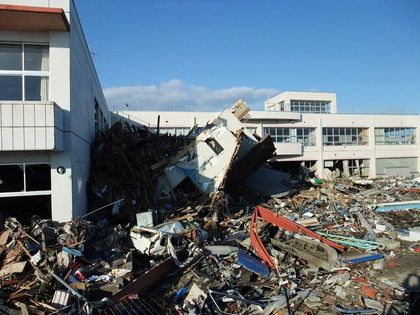
Nakano Elementary School three days after the earthquake.
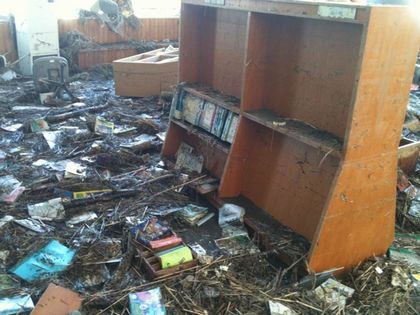
Tsunami-devastated library of Higashi Rokugo Elementary School.
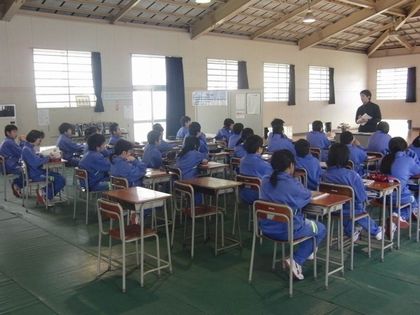
Nishiyama Junior High School had to give classes in the gymnasium until they
could start using the prefabricated temporary school building on 7 November.
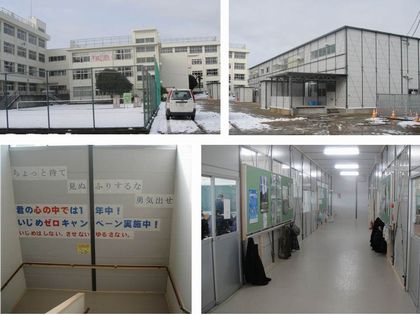
Atago Junior High School. The concrete school buildings are too dangerous to enter.
They had to give classes in the gymnasium with the makeshift classrooms separated by cardboard
until they could start using the prefabricated temporary school building on 7 November.
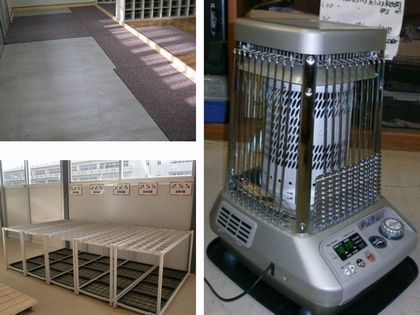
Door mats, unbrella stands and kerosene stoves were needed for the classrooms
in the temporary school buildings.
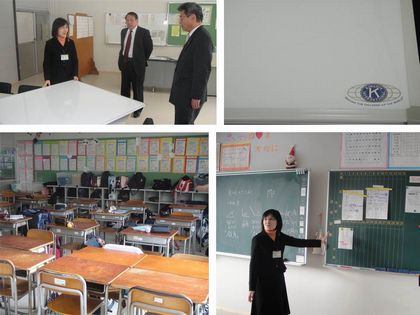
Schedule boards for the classrooms in Atago Junior High School.
The pre-installed monthly schedule boards are useless. They are to convert the donated white boards
into the new weekly schedule boards, since the old ones cannot be taken out from the old classrooms.
From the right, Kazuhiro TAKAGI (Past President, KC of Sendai), Hitoshi TAKANO (Principal) and
Tomoko WAKASA (Vice-Principal).

One of the new schedule boards in action.






























































































































































